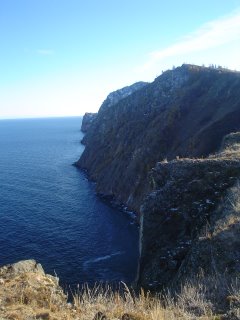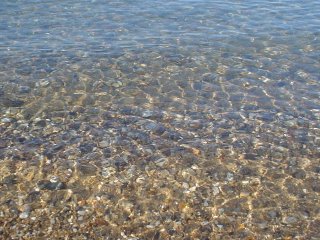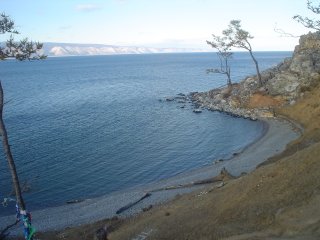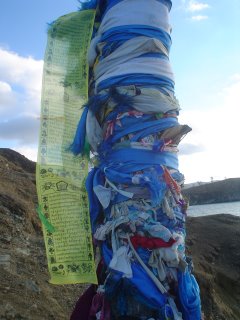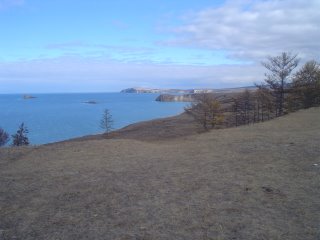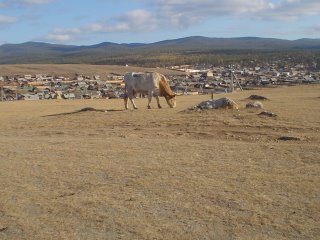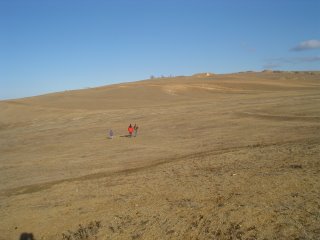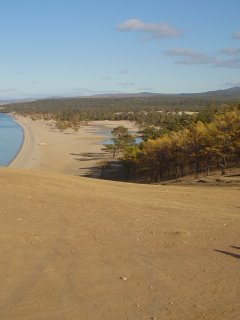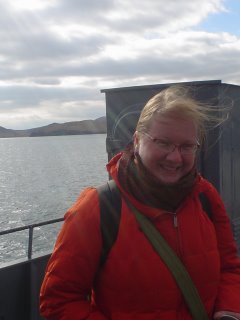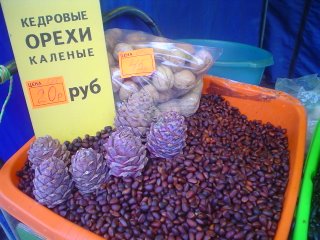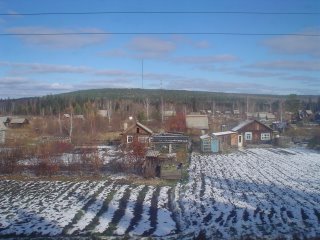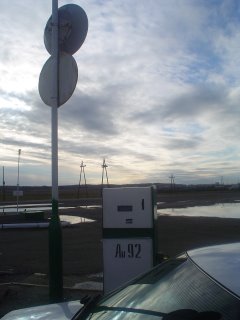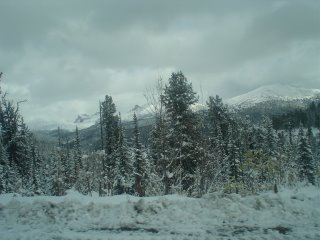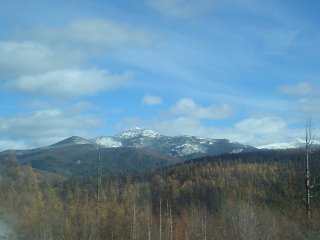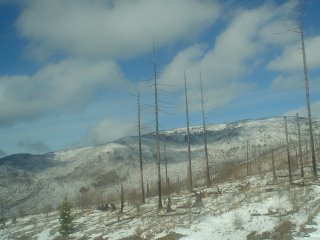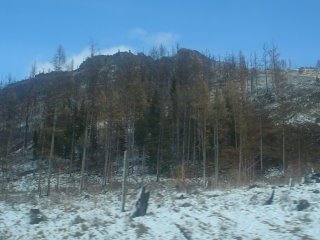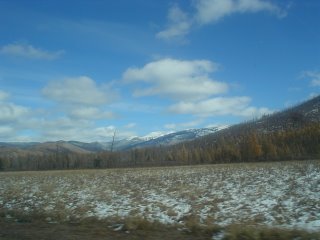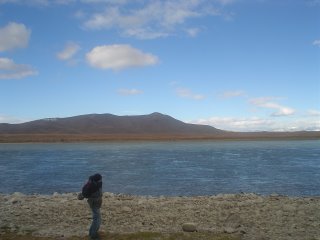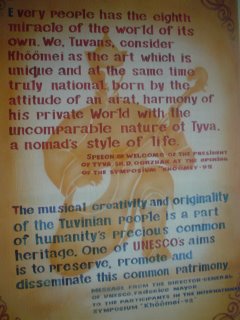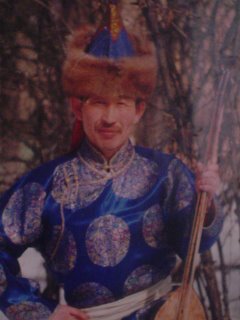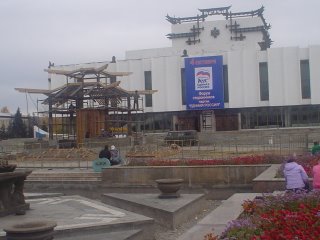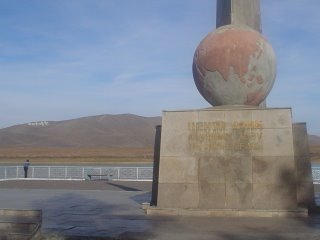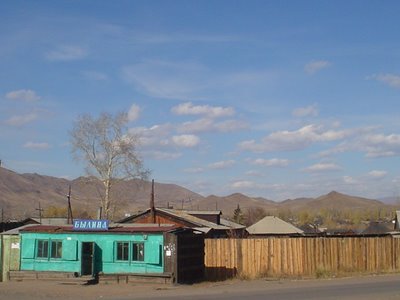Sunday
On Sunday we awoke to the 5 am drum parade circulating around our door, which was good preparation for a four-hour church service with three offerings, during which the preacher preached about how we are no different than madness with our clothes unfit for public consumption. “If he treated his first wife that way he’ll treat you the same; don’t believe his smooth talk!” he admonished us as we sweated in our tight white traditional funeral wear, up front and centre under the light of the videographer, projected onto the big screen TV. During the collections he reminded the congregation that believers give generously.
Patrick made no qualms about explaining the service. “All they want is money,” he said. “People here living hand to mouth in abject poverty and they have three offerings! Keep us in church for four hours.” He’s a believer but he has his limits and he doesn’t understand how so many different races could all be descendant from Adam and Eve either.
We relieved our post-church headaches in a dance with David’s nephews and nieces, Bernard, Evans and Albert and the twin girls both named Albena, with whom we exchanged moves and drew a crowd until David’s drunken cousin gave us the old pinch, a hard one. We asked David to give him a little talk, which David did very publicly before sending him home for the night, leaving us to sheepishly sip our cokes in the courtyard, where the kids raised Cain with paper airplanes and cranes made by Miia. Bernard sat on my lap and I snuck him sips of my coke (such a delicacy is not normally wasted on children). When I told him to share the remainder with his friends a near brawl ensued, and somehow David’s son Sim was at the epicentre. “That boy is mad,” said Bernard. Sim’s culture shock seemed to be agitating his ADD and none of the locals’ efforts to teach him good Ghanaian manners seemed to help much. A few piggyback rides distracted the kids from their problems.
We ate dinner with Dacosta, who loves the village food because it is so much fresher than in the city he now calls home.
Producing and Exporting Countries
After all the official things we had the chance to linger in bed and talk politics to the backbeat of the usual Christian music from the electronics store. “Why don’t all the cocoa, coffee and sugar producers create a CCSPEC and take Nestle over, drive up the prices on our non-petroleum addictions and make more money for the farmers.” That kind of nonsense. “Funny how cell phones make sense here and have brought people together, but they still exclude rural people who don’t have money and can’t get signals.”
Eventually we made way to see the Chief, passing a hoard of pre-schoolers on the way who made up a song: “white man give me money.” Their voices were beautiful until someone explained what the words meant.
We discussed the latest of David’s brain children with the Chief: he wants to start an organization and build a community centre, and we agreed to chip in a few dollars. Somehow this small gesture led to the Chief offering to make us Sub-Chief and Queen Mother, an offer that came with a lesson in the Chieftancy system (a subject on which the Chief has written a yet unpublished book): they must maintain political neutrality with no partisan affiliation, yet be judge jury mayor and planner for their village. The Chief is accountable to the village elders, who chose him and can remove him any time – unlikely in this case because he has served as Chief for 40 years. Society is patralineal with tremendous importance placed on clan or extended family. No one is without a parent: David has just inherited his father’s sister as his new mother. Age cannot prevent parentage; in some cases your father’s brothers little boy is considered your father. This way people are cared for all their lives; they are never alone and, from the North American point of view, they never have privacy.
By the time we left the Chief we had somehow committed ourselves to return for a ceremony in honour of our small gift toward the community centre. We thanked him for his lessons and his time and Henry took us straight to the senior secondary school, where the security guard had more time to kill than intruders and had landscaped himself a rock, sand, grass and shrub garden, which he took great delight in showing us. When we found the principal he was quick to announce, “We are a deprived school with many needs: lab equipment, books, uniforms.” The school receives little government support and runs mostly from school fees, which prevent many of the villagers from gaining an education beyond primary school. My internal calculator told me that the money required to educate every child in the village would be a few tens of thousands of dollars a year, and I wished I had that much to give or that I could devise an effective educational system that doesn’t require books, equipment, uniforms or buildings, only teachers. But I’m much better at criticizing pedagogy than inventing it.
The mild depression induced by the principal was quickly cured by the students whose classes we visited briefly. They were full of enthusiasm for life’s possibilities and asked us questions like ‘are you married?’ and ‘do you use chemistry in your life?’ We promised to return with addresses for Canadian universities so they can send away for application packages.
We left when classes were dismissed and later Dacosta accompanied to town on a full-sized bus like you find in rich countries, with a raised section in the back that gave us a clear view of the madness of the countryside roads. With fresh memories of the accident we held tightly to the seat in front of us and consoled ourselves with thoughts of the great mass of the vehicle and the unlikelihood of it crumpling around us in an accident. We made it safely to town but struck out on arrival: no sunscreen and no power. We checked our email at a café with a generator and took a 90 miles an hour taxi back to the village, holding hands. There was a dispute over the fee in which the driver refused our money unless more was added. Dacosta won the argument, as is his way.
We decided that night, based on village life, that I’m stronger at handling resource scarcity and Miia is stronger at handling the intense scrutiny and attention of an entire society. As a cab driver later pointed out to us, “no one is so strong in a car accident.”
Unearned Expertise
On our way to catch our ride back to Accra we met Ahmed, who had been our translator with the Chief (who speaks perfect English but tradition demands a translator). He told me that he started a local environmental group called Evergreen and he’d love my advice, something I felt utterly unqualified to offer, yet would have loved to learn more about. We agreed to talk in more detail on my return.
We got a ride with David’s old ‘mentor’ The Captain, who captains an Iranian merchant ship and runs several businesses (internet café, taxi service, farms, etc.). A few minutes down the road we heard a tearing noise and shrapnel started raining in through the open back window on Miia. She ducked into me in the middle seat and was luckily unharmed. It turned out to be nothing worse than a shredded tire but on the heals of the accident it had our hearts racing.
David and Patrick were just a few minutes behind us in a Tro-Tro (minivan bus) and were able to get us another ride into the nearest town, from where we we took a Tro-Tro all the way to Accra, which was thankfully uneventful.
We made it back just in time for the launch of CofA, College for Ama (a Saturday born woman likely to be studious by nature).
Two of the three founders gave speeches mentioning the importance of their fathers, who were visionary enough to insist on the education of their daughters in villages where female education is often seen as wasteful. Helen told of how her father used to make her take our library books and tell him what she learned before returning them. Professor Nana Apt added a story about how she returned to her home village to seek out her four former female classmates. One was dead, one in a mental institution, one old before her time, and the last led a life riddled with problems. Only she had been able to complete school and have more options, she told us. She wanted her program to help other girls have options.
There were supporters there all the way from the UK and America, one of whom read a beautiful poem about the birth of her daughter and her contemplation about whether the men in her life understood the importance of supporting the girl through her life. Another woman had started a similar program in Oregon and was raising money to give American girls the chance to travel to Ghana and meet and learn with their counterparts and peers here. She finished by giving a small check that her students had raised for CofA, but her speech felt sort of like a sales pitch. There were many questions, the most potent of which was “why are you focusing only on strong female students; what about weak students, shouldn’t they too receive support in their education?”
After the formalities we met Theresa, who works with an HIV education group in northern Ghana and invited us to come see their work, and Matt from Seattle who raises money for the private university and has lived her long enough to learn some Twi. It was he who informed us of the weekly pickup basketball games, though we have yet to see him there.
Outside attempting to sate our daylong hunger with crackers and fanta Jima found us; he had been sent to take us back to Lydia’s. We begged him to stop at a Chop so we could eat some faster than average cheap and tasty food.
New NGOs
Despite receiving several requests to start an NGO here we remain firm in our position that we are better suited to get involved with the work that is already happening here. We have neither the time, the money, nor the expertise to identify unfulfilled needs and try to fill them with an organization that we would have to abandon when we go home anyway.
Lydia on the other hand does have the expertise to see what is needed here, and she wants to start an organization to take care of the many orphans who end up on the streets of Accra, before they get there. It’s difficult for her though because she has to take care of the world’s strongest baby by herself. “This child is ruining my life,” she jokes. “I just need find a buyer for him.” Isaac usually responds by finding something to pull into pieces, preferably a piece of electronics or jewelry.
We gave Lydia some advice on her NGO: “write a business plan, explain how you will monitor results, get a board of committed, well connected and preferably rich people who can offer time and skills.”
She looked at us kind of blankly and said, “Nobody in Ghana helps like that.” Aside from the year of mandatory volunteer work Ghanaians do not have that culture of volunteerism, maybe because money is scarce or maybe because government here actually puts what resources it can into education, health and poverty reduction.
I tried to excuse our big talk and encourage her to start small, who knows where it could go. I hope she will give it a go, but even small scale it’s a big undertaking. We let it go and showed her our travel pictures and she showed us family photos on her laptop. Then we went shopping.
Market Madness
We made major investments in Ghanaian knowledge at the university bookshop – what a treasure chest! Then in the insanity of Makolah Market I was mobbed by five purveyors of pants, each frantically searching to show me a size 32, light coloured, cotton pair, except they showed me everything but. Only the sixth seller succeeded. Lydia bought a few things too, one of which was a tea towel she didn’t need. “I bought it because she was pregnant and has been walking in the sun for hours,” she told us.
A beautiful day was marred by marginally a corrupt cop, who pulled us over when Jima allegedly ran a red light on a left turn. He hopped into Jima’s lap and asked for a license, which was not produced. Lydia took the wheel and the cop informed her they were under arrest. They argued in Twi until we reached the police station, when Lydia finally relented to the 20,000 cedi ($2.50) bribe. On the way home she saw a cripple begging on the road; he was from her hometown so she put the window down to chat and gave him 10,000.
Two Tips for Life in Accra
When walking through the market at night watching vendors sell Nike and Nokia by candlelight, stuff all valuables out of reach and out of sight. I’ve had several failed and one successful pickpocket attempts against me. Luckily the successful one got only 30,000 cedies (a few dollars). Also watch for crotch-grabbing perverts.
When sitting in traffic you can get lots of shopping done as people come to your window selling batteries, garlic, halogen lamps, towels, toothpaste, health creams, bread, water, snacks, thighmasters, etc. etc. Just make sure you have roughly the right change otherwise the poor vendor may have to chase you for miles to give you your change once the lights change. Some vendors will even come onto the bus and make an elaborate pitch selling the greatest things at the best prices guaranteed.
The Captain
Meanwhile David had arranged for our free accommodation with Captain, who refused our offer of rent because it would be a betrayal to all the kindnesses he had received during his many world travels. “Believe me,” he said, “every time I travel I end up in someone’s home!” Everything the Captain says is an exclamation point.
“We have seven rooms and just us,” he added, neglecting to mention (as people often do) their ten-year-old nephew Little John, whose family is too poor and large to send him to school, so he lives with the Captain, does housework and in return receives room board and an education. How he finds time to study when he spends every waking moment doing domestic labour or being barked at to do more is beyond me.
So, we moved across town to what the Captain calls “the slums,” where we live in a 7-room house surrounded by walls covered in upturned shards of glass. The Captain is liberal only in his love of loudly sharing his opinion. When I told him I had started working at The Statesman he suggested that I demand a driver and payment in US dollars, thousands of them per week, more than I made in Canada. He has no qualms about expressing his displeasure with our friend David, whom he thinks is using us to build his own status here. “I gave that financial support to go to Canada,” he told us. “And I never hear from him again, no ‘hello, how are you?’ from him until he needs something from me.” The Captain yells and his wife Sarah barks; their daughter, who has moved back home, squeals like a psychotic infant on steroids. On our way here Captain had complained about the noise of the neighbours, but the only noise we get here is internally generated.
In the living room two of life’s great luxuries are almost always running: air conditioning and a maximum volume television. They are off when the power is out, which happens every sixth night in this part of town in order to save power. (Excluding personal generators, there is one source of electricity in this country: one dam in the Volta.) The sixth night comes without power or sleep because without our fan heat and mosquitoes get the better of us.
Aside from the treatment of Little John, these are minor annoyances and we have certain luxuries here, like our own private room and a bathroom we share with Little John; access to the kitchen and the Captain’s extensive DVD knockoffs from China, where he tells us you can see the best acrobatic acts in the world so don’t even try to tell him about Mongolia.
Living in gated comfort in a city with so much need is a great source of guilt, so we comfort ourselves with the knowledge that so far we are giving our free labour and maybe we will donate the rent we would have been paying to a good organization, sort of buying our conscious I guess.
That first night the Captain complained that his farm labourers, who are paid by the weight they pick, will always cheat given the chance. He has since told us that African culture is bullshit and that Arabs are not human – funny opinions for an African who makes his living via an Iranian merchant ship. “What would Woody Guthrie do?” Miia asked me. I told her Woody never went to Africa.
Teeth
Right before I left Canada I got a filling and that tooth has been hurting ever since. Miia’s Uncle Lauri in Finland, who is a dentist, took a look at it and found nothing wrong, but somewhere in Russia the pain became pretty severe. I picked up some gargle in Mongolia and cream in Japan, but soon a lump emerged from the gum. Finally in Ghana I made an appointment with a dentist recommended by our guidebook.
“He’s probably friends with the author,” Captain bellowed. “He’ll charge you US dollars! Go to my dentist and pay in cedis, he has taken good care of me and my family!” Captain’s dentist, who really is very good I think and takes the time to explain things to me, quickly determined that the filling had been set too close to my gum and infected it, causing the lump and the pain. I’ve been on antibiotics ever since with some improvement, but I’m likely looking at a root canal in the new year.
International Solidarity
We have been on the lookout for ‘international solidarity workers’ here, i.e., people who care about people and the planet and are volunteering or working to do something about it. We even visited the Canadian embassy with vague daydreams of a cocktail reception with beavertails and poutine. We were sorely disappointed when there were no other Canadians there, not even on staff. We enjoyed a little AC as we filled out a form, and I saluted the flag (half mockingly and half homesickly) on the way out of the compound. The guards thought that was pretty funny.
The guards there, despite being Ghanaian, were laid back Canadian style with no guns. On the streets however I often see cops carrying rifles around, which is a little disconcerting. These are very young men generally, and even the military is barred from carrying weapons in public here. Fortunately, aside from traffic bribes, the cops here are not so overtly corrupt and don’t throw their weight around. There was a National Reconciliation Commission two years back and its recommendations seem to have done well to create stability and harmony here.
And just that afternoon we finally met some of those international solidarity workers, Tim from the UK and Megan from the USofA, who are paying to volunteer in a village for several months. The four of us popped in to see the launch of a new web site called Stop Killing Us, about climate change in Africa, which should have been interesting but consisted of watching people scroll through the web site while eerie music played. We invited our new friends to join us in visiting Dacosta and WO (warrant officer) for dinner at Burma Camp but they had to get back to their village.
The food at WO’s place was familiar and it turns out WO’s wife cooked all our food during Mercy’s funeral, even though several other women had taken credit for it. During dinner we met WO’s brother, an electrical engineer, who told us all about electricity supply in Ghana before retiring early. WO told us about Lebanon, from where he recently returned. “What happened there was terrible,” he confirmed. He’s been a soldier for more than 30 years and has survived too many dictatorships to count; he’ll retire soon. I told him and Dacosta about how my grandfather was in the air-force and was in WWII and they thought they had misunderstood when I told them his age. There are very few 90-year-olds around here.
We chatted politics briefly while watching the evening news, which focused on HIV and agriculture because it was Farmer’s Day in Ghana and AIDS Day internationally. It was pleasant and easy but as usual the transfer of information was a challenge because of language, cultural, and knowledge gaps. We know so little of this place and they know so little of ours, and they probably aren’t used to being asked so many questions.
The Statesman
I met the chief editor of The Statesman on Friday and started working there that Monday. He liked my credentials and thought I might help start a development desk, get some good stories and build contacts with district governments throughout the country. He introduced me around a bit and I met the editor, a woman from the UK who has been with the paper just over a year, the cartoonist, and the “youngest” staffer, the sports editor who everyone calls Uncle.
On Monday I met the rest of the editorial staff in a supposedly daily editorial meeting tentatively scheduled at 11 am. In reality, most days there is no editorial meeting. Mostly we discussed the special xmas issue coming out on Dec. 22, used largely to draw advertising revenue because the paper, which only recently went daily and is still running at a loss, hence my lack of pay. I’m okay calling it a great learning experience for now. It also gives me credibility and access; next week I will be interviewing the Attorney General and the national Chief of Chiefs. Even among my Ghanaian friends I feel like this work has earned me a new level of respect and understanding of what I’m about and what I’m doing here. Patrick in particular, who has always given me much respect, is a big fan of The Statesman and is a member of the ruling political party. He read my first editorial while I sat with him on a Tro Tro and was duly impressed. He promptly opened up to me about the need for good business practices in Ghana and to allow for leadership from the grassroots, politically and in business. “People are suffering,” he told me, “and they need to be heard.” He explained that in Ghana business is based on relationships and making the right impressions, but stressed that while he’ll grease the wheels with his charm he has never paid a bribe to get a contract.
According to Patrick and many others I’ve spoken with, The Statesman is a highly respected thinking person’s paper that shuns stories of petty crime and entertainment news (except in the weekend edition). At the same time, it struggles to be seen as truly independent from the ruling National Patriotic Party (NPP), which the paper supported long before it became government. It is supportive but does not pull punches when criticism is appropriate.
The editorial meeting though soon deteriorated into a series of complaints and questions: why doesn’t our unused vacation roll over into next year and how are we supposed to work on a special edition in addition to putting out a daily? The chief editor crushed all complaints in a lengthy lecture about being a team and following policy, during which he singled out several people who had offended him in various ways, leaving no room for dissent. All those lessons I learned about cross-cultural business came flooding back and still did not adequately explain all I was seeing and have seen since – it’s a different world.
Right away I was thrown to the wolves and given the task of interviewing Ben Ephson, editor of one of about 30 competing newspapers in Accra, about a very unscientific survey he did predicting the next president to be elected in 2008. “Hello Oburoni [White Man],” he greeted me, “have a seat.” He had the air of a big man was determined to let me know it. On the way over in a cab with an office boy as my guide I had quickly read Ephson’s pool and tried to memorize the names of the 16 candidates running for leadership and jotting down questions to ask. I guess I did alright because a beefed up version of my story was the lead story the next day. Miia and I celebrated with coke and red red (beans and plaintain).
Since then I’ve been writing every day, sometimes a little and sometimes a lot, and inviting large companies to pay to be featured with a story by me about them in our xmas edition – this is where commission could come in but I think I prefer writing for free than pitching for money.
Little John
We spend a fair bit of our time with Captain’s nephew, Little John, fighting for the right to do our own dishes – so well trained is he that he anticipates our needs before we dream them, brings me ice water after seeing me root around in the fridge unsuccessfully. He doesn’t understand that it is awkward for us to be so well served by a little boy (or anyone really).
He is as sweet and kind and hardworking a kid as anyone could hope to meet, yet I’ve never his “parents” praise him, only bark orders. Wondering if maybe we were being cultural fascists in judging Captain and Cynthia harshly for their treatment of Little John, Miia and I have each discussed the situation with other Ghanaians.
“I am opposed to that,” is what Patrick said to me, and Professor Apt said about the same to Miia. Patrick said no matter how poor he was he could never fathom letting his child go be a labourer in someone’s house. “They have no childhood,” he said, and Professor Apt has trouble remaining friends with people who have ‘foster children.’ Still, we know that Little John would have a very difficult life back in the village competing with his siblings for food.
I do feel that our presence here is good for him, if I can be so arrogant, because we are constantly giving him positive feedback and Miia has managed to get him laughing with a never-ending barrage of pokes, tickles, squeezes and jokes. He seems to like us and we like him a lot.
Sunday, December 17, 2006
Friday, December 15, 2006
Two Stories Proud
Here are two recent pieces I did for The Statesman that I'm kind of proud of, the first is a special feature and the second a commentary:
The Development of Akim Ayirebi (photo by Miia Suokonautio)
A Warrior Dies but the War Lives On
Chris
The Development of Akim Ayirebi (photo by Miia Suokonautio)
A Warrior Dies but the War Lives On
Chris
Wednesday, December 13, 2006
Good News and Staying On
There are a few different things to write about about life in Ghana. Where to begin?
I met a German woman Meike yesterday who had found online the NGO where I will be and agreed by email to come volunteer in Ghana for 3 months with them. She took time off school to come live in Africa. When I met her, her eyes were full of tears and she had just finished changing her plane ticket to go back to Germany today. She had come with her fiance about a month ago and they had spent two weeks going around together. He went back after two weeks (as they had planned) and she was to then start her position in the slums. She said she ended up getting malaria almost as soon as he left but it seemed to me that she had a serious case of home sickness. She just wanted to go home.
As I listened to Meike I wanted to say, "I know! I felt the same way but it gets better. It really does. You just gotta keep trying." But it was too late. Her ticket was already changed and she was relieved to be going home today.
So what would I say to her if I were to say something?
I would say that although it's not obvious on first glance, there's so much good here. You can find a corner restaurant, a little internet cafe, a place to live, favourite waitresses and water vendors and newspaper vendors... When most big cities in the world are criticized for being so anonymous, this is not one of them. Here you can meet people and start to carve out a small space for yourself in no time.
I would tell her that the NGO she's partnered with is actually amazing. That Farouk, the director, is an incredible man. A passionate, smiley eyed genius. He's busy but he's busy because he's committed and working hard to make a difference in the lives of people who are in a bad situation. He believes in his own country and his own people and while so many Ghanaians with education and money are running to the North, he has stayed here to make change.
The way the organization runs and the model they work with, approaching their work as empowerment is incredible. How they have found leaders from within the slum community, how the microcredit program is actually working and getting more money into people's pockets, the way so many women are taking on leadership roles in a place where women are rarely given positions of power... I would want to help her see all this.
On Tuesday nights Chris and I play basketball with a group of foreigners to Ghana, mostly Americans and Canadians though many Europeans too. It's the one time of the week where I really have anything to do with white people aside from Chris. I realize this when I realize how different it is and how, bit by bit, I become more accultured to Ghanaians and find encountering the Northeners hard - competitive, individualistic, brash. None of the easy smiles and warm handshakes like the Ghanaians. If I were to go into a group of Ghanaians, I would shake everyone's hands and we would all introduce ourselves and we would ask of each other how we were. Among the basketball crowd, it's nothing like that and when I try to talk to people, they stare at me like I'm breaking some unspoken rules.
I am learning through experience.
But still, I like playing basketball and I like the running, the game, the sweating.
On Wednesday nights is a spoken word poetry reading at a local bar. Art too happens.
In the slums, at the community meeting, the moderator shouted, "Information!" and the people responded, "Power!" Then he shouted, "Homeless!" and the people answered, "But not hopeless!" Though it's me who has money, education, access to resources, their togetherness makes them so powerful. This too I like.
After basketball we go to a little restaurant called Chicken Lickin and indulge in a rare treat - cheese. People here don't eat cheese really so a vegetarian pizza on Tuesdays is a beautiful thing.
At the bookstore at the university, they have an extensive collection of fiction and nonfiction by Ghanaian authors. Chris and I bought a ton (maybe our single largest expense since we got here) and have been eating up the books. Even though I tried hard before leaving Canada to find books about Ghana and by Ghanaians, it was a near impossibility. But how good to read the words of Ghanaians reflecting life, studies, and stories!
I had a meeting this morning with a social work professor at the University of Ghana in Legon. It looks like I'll be teaching three courses beginning in January at the undergraduate level in the Department of Social Work. The prof I met with is great and though we only spent a little time together, he too struck me as brilliant and we had an excellent conversation. I'm looking forward to the chance to learn more from him, to teach, to meet more Ghanaians through the university, and even just to learn so much about social work in Ghana. Things keep happening when you network and meet people, talk to them, learn from them.
I would tell Meike not to give up; there are so many opportunities for so many things here.
I've been very diligent in not taking taxis even though they are cheap by Canadian standards. I make my way around town by minibus with the 12-20 other Ghanaian passengers with me, throwing myself into life here while learning the layout of the city. When we went to basketball, I met an expat woman who hasn't used a bus yet - just taxis and rides in private cars. Funny, I thought. I don't think I would even have the heart for that because although the minibuses are hot and can take a long time, are sometimes inconvenient and sometimes rough, they are also part of the transport of the people and if I want to learn about the people, then I should live among them, no?
But still, it can be hard here too. The pollution depresses me. It's so filthy and the waters hideous. The poverty depresses me, especially those who seem in such a bad way, sleeping on the roads, the kids begging, the people with disabilities grabbing at my ankles as I walk by. Chris was pickpocketed the other day and I had some random guy just grab my crotch as we were walking past. I hate that I can never just relax and my guard is always up. Three young girls stopped me yesterday as I was walking and talking to Chris on my cell phone to warn me that there are thieves about and I should be careful to watch my phone. Thoughtful girls.
The countryside too has many problems and as I think about all the people who ask us to take them to Canada, it's hard to really get excited about a place when people here aren't so excited about it either. The worst is when a mother holds up her baby, maybe a year old or even less, and says, "Take my baby to Canada." My heart breaks.
These are funny these so-called developing countries. So much poverty, frustration, problems. Yet at the same time such brilliant light and so many causes for hope and celebration. So much for me to learn.
I met a German woman Meike yesterday who had found online the NGO where I will be and agreed by email to come volunteer in Ghana for 3 months with them. She took time off school to come live in Africa. When I met her, her eyes were full of tears and she had just finished changing her plane ticket to go back to Germany today. She had come with her fiance about a month ago and they had spent two weeks going around together. He went back after two weeks (as they had planned) and she was to then start her position in the slums. She said she ended up getting malaria almost as soon as he left but it seemed to me that she had a serious case of home sickness. She just wanted to go home.
As I listened to Meike I wanted to say, "I know! I felt the same way but it gets better. It really does. You just gotta keep trying." But it was too late. Her ticket was already changed and she was relieved to be going home today.
So what would I say to her if I were to say something?
I would say that although it's not obvious on first glance, there's so much good here. You can find a corner restaurant, a little internet cafe, a place to live, favourite waitresses and water vendors and newspaper vendors... When most big cities in the world are criticized for being so anonymous, this is not one of them. Here you can meet people and start to carve out a small space for yourself in no time.
I would tell her that the NGO she's partnered with is actually amazing. That Farouk, the director, is an incredible man. A passionate, smiley eyed genius. He's busy but he's busy because he's committed and working hard to make a difference in the lives of people who are in a bad situation. He believes in his own country and his own people and while so many Ghanaians with education and money are running to the North, he has stayed here to make change.
The way the organization runs and the model they work with, approaching their work as empowerment is incredible. How they have found leaders from within the slum community, how the microcredit program is actually working and getting more money into people's pockets, the way so many women are taking on leadership roles in a place where women are rarely given positions of power... I would want to help her see all this.
On Tuesday nights Chris and I play basketball with a group of foreigners to Ghana, mostly Americans and Canadians though many Europeans too. It's the one time of the week where I really have anything to do with white people aside from Chris. I realize this when I realize how different it is and how, bit by bit, I become more accultured to Ghanaians and find encountering the Northeners hard - competitive, individualistic, brash. None of the easy smiles and warm handshakes like the Ghanaians. If I were to go into a group of Ghanaians, I would shake everyone's hands and we would all introduce ourselves and we would ask of each other how we were. Among the basketball crowd, it's nothing like that and when I try to talk to people, they stare at me like I'm breaking some unspoken rules.
I am learning through experience.
But still, I like playing basketball and I like the running, the game, the sweating.
On Wednesday nights is a spoken word poetry reading at a local bar. Art too happens.
In the slums, at the community meeting, the moderator shouted, "Information!" and the people responded, "Power!" Then he shouted, "Homeless!" and the people answered, "But not hopeless!" Though it's me who has money, education, access to resources, their togetherness makes them so powerful. This too I like.
After basketball we go to a little restaurant called Chicken Lickin and indulge in a rare treat - cheese. People here don't eat cheese really so a vegetarian pizza on Tuesdays is a beautiful thing.
At the bookstore at the university, they have an extensive collection of fiction and nonfiction by Ghanaian authors. Chris and I bought a ton (maybe our single largest expense since we got here) and have been eating up the books. Even though I tried hard before leaving Canada to find books about Ghana and by Ghanaians, it was a near impossibility. But how good to read the words of Ghanaians reflecting life, studies, and stories!
I had a meeting this morning with a social work professor at the University of Ghana in Legon. It looks like I'll be teaching three courses beginning in January at the undergraduate level in the Department of Social Work. The prof I met with is great and though we only spent a little time together, he too struck me as brilliant and we had an excellent conversation. I'm looking forward to the chance to learn more from him, to teach, to meet more Ghanaians through the university, and even just to learn so much about social work in Ghana. Things keep happening when you network and meet people, talk to them, learn from them.
I would tell Meike not to give up; there are so many opportunities for so many things here.
I've been very diligent in not taking taxis even though they are cheap by Canadian standards. I make my way around town by minibus with the 12-20 other Ghanaian passengers with me, throwing myself into life here while learning the layout of the city. When we went to basketball, I met an expat woman who hasn't used a bus yet - just taxis and rides in private cars. Funny, I thought. I don't think I would even have the heart for that because although the minibuses are hot and can take a long time, are sometimes inconvenient and sometimes rough, they are also part of the transport of the people and if I want to learn about the people, then I should live among them, no?
But still, it can be hard here too. The pollution depresses me. It's so filthy and the waters hideous. The poverty depresses me, especially those who seem in such a bad way, sleeping on the roads, the kids begging, the people with disabilities grabbing at my ankles as I walk by. Chris was pickpocketed the other day and I had some random guy just grab my crotch as we were walking past. I hate that I can never just relax and my guard is always up. Three young girls stopped me yesterday as I was walking and talking to Chris on my cell phone to warn me that there are thieves about and I should be careful to watch my phone. Thoughtful girls.
The countryside too has many problems and as I think about all the people who ask us to take them to Canada, it's hard to really get excited about a place when people here aren't so excited about it either. The worst is when a mother holds up her baby, maybe a year old or even less, and says, "Take my baby to Canada." My heart breaks.
These are funny these so-called developing countries. So much poverty, frustration, problems. Yet at the same time such brilliant light and so many causes for hope and celebration. So much for me to learn.
Sunday, December 10, 2006
Pieces of the Puzzle
Hi folks,
The posts below are more stories from the village, but to bring you up to speed on current events:
We just came back from a day at the beach, where the waves were huge and the water warm and salty. We spent a few great hours there with our friend Henry and some interesting Nigerian characters who we later saw involved in a near fight - they were a little '10-foot-tall-drunk-and-bullet-proof' and our association with them started when the younger of the two brothers tried to pick up Miia while I went to meet Henry.
Miia seems quite popular with the boys here (even more than at home) so I am suddenly feeling all protective, which is strange because frankly she can take good care of herself and always has. But, us being a team, she being the most important thing to me in life, I don't like it when people mistreat her or assume because she is sitting by herself they should make her their business.
That aside, I think we are adjusting to the culture somewhat and to the reality that privacy is concept that many peoples of our planet do not share - it is just not part of the cultural vocabulary, especially in the village. We went back to the village this weekend to make a small donation to a community centre, along with David. There was an insane amount of attention paid us and multiple requests for money or to start an NGO there, something we don't really have the capacity to do. It is difficult because we want to help, we want to be open, and we want to establish real relationships with people, but it is hard because the expectation of money is ever-lurking.
On the upside, we are happy to be back in the city, and I am really enjoying working at the Statesman. My boss, the editor, is a genius with more conservative politics than my own, which is a good learning experience. He puts a lot of faith in me but not so much that it is impossible to live up to. Miia is poised to become involved in the project with the slums and possible a couple of other things too, like the CofA project for example. We have some very good local friends already, and will hopefully make more expat friends through basketball - it's good to have a mix because expats understand the culture shock and adjustments one makes.
Life is good and the best thing, for me, is that I learn more here each day than I could in months at home. I, not knowing this place, am like an infant absorbing new pieces of the Ghanaian puzzle by the second.
Chris
The posts below are more stories from the village, but to bring you up to speed on current events:
We just came back from a day at the beach, where the waves were huge and the water warm and salty. We spent a few great hours there with our friend Henry and some interesting Nigerian characters who we later saw involved in a near fight - they were a little '10-foot-tall-drunk-and-bullet-proof' and our association with them started when the younger of the two brothers tried to pick up Miia while I went to meet Henry.
Miia seems quite popular with the boys here (even more than at home) so I am suddenly feeling all protective, which is strange because frankly she can take good care of herself and always has. But, us being a team, she being the most important thing to me in life, I don't like it when people mistreat her or assume because she is sitting by herself they should make her their business.
That aside, I think we are adjusting to the culture somewhat and to the reality that privacy is concept that many peoples of our planet do not share - it is just not part of the cultural vocabulary, especially in the village. We went back to the village this weekend to make a small donation to a community centre, along with David. There was an insane amount of attention paid us and multiple requests for money or to start an NGO there, something we don't really have the capacity to do. It is difficult because we want to help, we want to be open, and we want to establish real relationships with people, but it is hard because the expectation of money is ever-lurking.
On the upside, we are happy to be back in the city, and I am really enjoying working at the Statesman. My boss, the editor, is a genius with more conservative politics than my own, which is a good learning experience. He puts a lot of faith in me but not so much that it is impossible to live up to. Miia is poised to become involved in the project with the slums and possible a couple of other things too, like the CofA project for example. We have some very good local friends already, and will hopefully make more expat friends through basketball - it's good to have a mix because expats understand the culture shock and adjustments one makes.
Life is good and the best thing, for me, is that I learn more here each day than I could in months at home. I, not knowing this place, am like an infant absorbing new pieces of the Ghanaian puzzle by the second.
Chris
Libations
Following a four-rice lunch and a glass of Guinness that trickled down-throat like molasses, there was dancing and donations in the town square, where three funerals converged and each set of mourners took turns on the dance dirt. Miia and I obliged the old ladies by kicking up dust with them as they waved kercheifs bearing Mercy's visage in our faces and some of the bolder (or higher on Kola nuts) among them went to grinding us, mainly me. We dodged them deftly and ran full tilt boogie into the children, who showed us some moves then cheered en masse as if we were hiphop superstars as we copied them then added our own innovations.
Our protectors ensured, by force of pinching our arms if necessary, that we danced no more than a few beats at a time and ushered us to our lawn furniture whenever things got too dusty-footed. Someone must have missed an assignment when a beggarman found his way beside us and asked for some money so he could become a Big City Cat. We guiltily refused and asked the man next to us (who turned out to be Edward, the owner of the apartment we were inhabiting) if people usually gave to beggars in Ayirebi. "No, if someone is hungry we give them food," he said. "That man must have been unwell to ask such a thing." Ethical burdens and personal fears: if we give this man money others will follow asking and human relationships are replaced by dependency on foreign whites and a vision of them as potential saviours or withholders of salvation.
We did give a small donation to help cover the enormous funeral costs (part of which was the cost of our presence there), and our attempts at subtlety were thwarted by Patrick announcing our gift over the microphone.
The dance ended at the onset of dusk because the main square has no lights and ample mosquitos. We adjourned to drinks and further dance lessons from our new friend Prince (a school teacher who was sweetly drunk and looking for his lost cell phone) at a local clandestine chop (food joint), which was boarded up to prevent late night drinkers from being exposed. The site of us dancing drew further hilarity and incredulity - white men dancing. We were quickly joined by Stanley, who won the USA Visa Lottery and will soon be moving to live with white people, whom he admires greatly despite knowing few. Knowing his fate but also the difficult conditions he was leaving, we could only wish him luck.
Our protectors ensured, by force of pinching our arms if necessary, that we danced no more than a few beats at a time and ushered us to our lawn furniture whenever things got too dusty-footed. Someone must have missed an assignment when a beggarman found his way beside us and asked for some money so he could become a Big City Cat. We guiltily refused and asked the man next to us (who turned out to be Edward, the owner of the apartment we were inhabiting) if people usually gave to beggars in Ayirebi. "No, if someone is hungry we give them food," he said. "That man must have been unwell to ask such a thing." Ethical burdens and personal fears: if we give this man money others will follow asking and human relationships are replaced by dependency on foreign whites and a vision of them as potential saviours or withholders of salvation.
We did give a small donation to help cover the enormous funeral costs (part of which was the cost of our presence there), and our attempts at subtlety were thwarted by Patrick announcing our gift over the microphone.
The dance ended at the onset of dusk because the main square has no lights and ample mosquitos. We adjourned to drinks and further dance lessons from our new friend Prince (a school teacher who was sweetly drunk and looking for his lost cell phone) at a local clandestine chop (food joint), which was boarded up to prevent late night drinkers from being exposed. The site of us dancing drew further hilarity and incredulity - white men dancing. We were quickly joined by Stanley, who won the USA Visa Lottery and will soon be moving to live with white people, whom he admires greatly despite knowing few. Knowing his fate but also the difficult conditions he was leaving, we could only wish him luck.
Burial
Under the midday African sun the coffin and its contents were lowered into the concrete lining endless red clay. We had joined the procession against ardent advice from our over-protective entourage and risked sunburn and sand fleas to bring our bodies along. More prayers were said and more songs were sung, more dances danced and more tears shed by convulsing mourners. The graveside service was mercifully short, and tragically beautiful. This was the final stage of sadness before the celebrations began in ernest. We cast our final glances toward Mercy as the first dirt struck her coffin. Gentle rest sweet lady.
Front Page News
If I may toot my horn a moment, I made the front page my first two days on the job at The Statesman, check it out:
Only Four Serious Contenders
Slashing the zeros makes sense; but why rush to join the Eco now?
Chris
Only Four Serious Contenders
Slashing the zeros makes sense; but why rush to join the Eco now?
Chris
Wednesday, December 06, 2006
In Praise of Small Things
Thanks to everyone who has emailed or posted comments with encouragement. Indeed, as time passes and we slowly and gradually get used to life here, the weight of culture shock slowly lifts. The sense of joy at finding our way, however tentative, is a genuine relief.
So here then a bit of a sunnier post than the last.
Chris will write later, I'm sure, about his first days and week at The Statesmen newspaper, but it seems to be going well and he is learning a lot. He started on Monday and already on Tuesday his name was on the first page of the paper, accompanying an article he's written on his first day. Chris' contribution to today's paper was the editorial. He's off in the mornings and done in the afternoon around 5pm. So he's back to the 9-5 since mid-May when we both finished work; a six month break that was really amazing.
I've been getting to know the city as I zoom about meeting people that I've researched and connected with. Yesterday I went to the head office of SYTO (Student and Youth Travel Organization) and met with their awesome coordinator Tina. SYTO basically gets students and youth from around the world and places them in families and hooks them up in volunteer placements. Since I came in through the back door (I found out about SYTO from some folks at the computer place), I bypassed the $850US program fee. Tina linked me up with Farouk, the director of People's Dialogue on Human Settlements, an NGO dedicated to working with the urban poor. I met with Farouk yesterday, as well as his colleague Kojo, driver Biggie, and associate from another branch of the NGO. We drove straight to a community meeting in Old Fadama, an enormous slum of 35,000 people living beside a lagoon in central-west Accra. The land they are on is especially contentious presently as the government is planning to evict the slum dwellers to clean the lagoon, currently one of the most polluted bodies of water in all of Africa. At the community meeting, the Ghanaian Ombudswoman on Human Rights was the guest of honour and was there to address the concerns and questions of the community as they are being told that their eviction is imminent. Where they are moving to and when is still uncertain and so the Ombudswoman did her best to answer questions though still in vague terms.
It looks like I will be working with Farouk and People's Dialogue facilitating community organizing in the slums. Descriptions of the slum might well be in order at this juncture, although I'm not sure words would suffice. Of course they are, as the name suggests, slums. Overcrowded, flithy, polluted, small ramshackle dwellings. It's an intense, noisy place. Yet, at the same time, the meeting we were at was filled with positive energy and the slumdwellers have begun to organize themselves and were asking key questions, holding the Ombudswoman accountable for her mandate of human rights. When the meeting began, one of the leaders shouted out, "Information!" and the people shouted in unison, "Power!" Again, "Information!" and the response, "Power!" Then the leader shouted, "Homeless!" and the people replied this time, "But not hopeless!" Their energy, enthusiasm, and conviction was infectious. I liked how Farouk deferred attention from himself to the community members, was warmly welcomed in the slum, and didn't hold my hand or put me into some special place of honour (as it seems to happen often by grace of nothing else but my race). I will be back at the NGO on Tuesday afternoon next week and we will talk more about some of the things I will be doing.
Today I met with Professor Nana Araba Apt, an amazing and inspiring woman who did her Master of Social Work at U of T and even did her practicum placement at St Christopher House - same as me! She is now teaching at the university but recently launched CofA, short for College for Amma, an initiative that partners female university students with female junior high students from rural areas in an effort to keep them in school. Nana and I had lunch and talked about some ideas on how I can help out with CofA during these intial steps, writing some grants reports and also talking about some pedagogical questions on how best to proceed in the program design and implementation. It's an exciting venture and I think it will be a good side project to help out with if People's Dialogue begins to take centre stage.
Lastly, Chris and I found out about a kind of pick-up basketball for expats on Tuesday nights at the Ghana International School. We went last night and had a blast. We were a mixed bag of people - probably about 25 in all, including 4 women. We played for a few hours, sweat like crazy, and had a good time just running around and playing some basketball. I had a good time and although it had little to do with me, my team won every game I played - four in all. I'm already looking forward to next Tuesday.
Tomorrow we are off back to the village where we will be meeting with the Chief and our friend David is hoping to launch a new foundation he's starting up in the village. It will probably be quieter than the funeral, but probably fun anyway.
Because I've spent some time this week running errands as well as meeting with people, I feel like I've become much more familiar with the city and how it works - a good first step on starting to feel at home. Slowly too I get to know ways of doing things, ways of getting involved, and learnings to be had. I look forward to the chance to do more in time.
So, after a tough weekend, things start to ease up a little. I am happy for the relief and looking forward to the chance to become ever increasingly familiar with life here.
For those interested, I've now got a cell phone as well. So, for Chris, you can call him at 233 207 343 423. For me, I'm at 233 207 462 914. Our home number (best to call between 8&10pm our time) is 233 213 01405. We are five hours ahead of Ontario and four ahead of Nova Scotia.
Much love to everyone and thanks again for all the support, Miia
So here then a bit of a sunnier post than the last.
Chris will write later, I'm sure, about his first days and week at The Statesmen newspaper, but it seems to be going well and he is learning a lot. He started on Monday and already on Tuesday his name was on the first page of the paper, accompanying an article he's written on his first day. Chris' contribution to today's paper was the editorial. He's off in the mornings and done in the afternoon around 5pm. So he's back to the 9-5 since mid-May when we both finished work; a six month break that was really amazing.
I've been getting to know the city as I zoom about meeting people that I've researched and connected with. Yesterday I went to the head office of SYTO (Student and Youth Travel Organization) and met with their awesome coordinator Tina. SYTO basically gets students and youth from around the world and places them in families and hooks them up in volunteer placements. Since I came in through the back door (I found out about SYTO from some folks at the computer place), I bypassed the $850US program fee. Tina linked me up with Farouk, the director of People's Dialogue on Human Settlements, an NGO dedicated to working with the urban poor. I met with Farouk yesterday, as well as his colleague Kojo, driver Biggie, and associate from another branch of the NGO. We drove straight to a community meeting in Old Fadama, an enormous slum of 35,000 people living beside a lagoon in central-west Accra. The land they are on is especially contentious presently as the government is planning to evict the slum dwellers to clean the lagoon, currently one of the most polluted bodies of water in all of Africa. At the community meeting, the Ghanaian Ombudswoman on Human Rights was the guest of honour and was there to address the concerns and questions of the community as they are being told that their eviction is imminent. Where they are moving to and when is still uncertain and so the Ombudswoman did her best to answer questions though still in vague terms.
It looks like I will be working with Farouk and People's Dialogue facilitating community organizing in the slums. Descriptions of the slum might well be in order at this juncture, although I'm not sure words would suffice. Of course they are, as the name suggests, slums. Overcrowded, flithy, polluted, small ramshackle dwellings. It's an intense, noisy place. Yet, at the same time, the meeting we were at was filled with positive energy and the slumdwellers have begun to organize themselves and were asking key questions, holding the Ombudswoman accountable for her mandate of human rights. When the meeting began, one of the leaders shouted out, "Information!" and the people shouted in unison, "Power!" Again, "Information!" and the response, "Power!" Then the leader shouted, "Homeless!" and the people replied this time, "But not hopeless!" Their energy, enthusiasm, and conviction was infectious. I liked how Farouk deferred attention from himself to the community members, was warmly welcomed in the slum, and didn't hold my hand or put me into some special place of honour (as it seems to happen often by grace of nothing else but my race). I will be back at the NGO on Tuesday afternoon next week and we will talk more about some of the things I will be doing.
Today I met with Professor Nana Araba Apt, an amazing and inspiring woman who did her Master of Social Work at U of T and even did her practicum placement at St Christopher House - same as me! She is now teaching at the university but recently launched CofA, short for College for Amma, an initiative that partners female university students with female junior high students from rural areas in an effort to keep them in school. Nana and I had lunch and talked about some ideas on how I can help out with CofA during these intial steps, writing some grants reports and also talking about some pedagogical questions on how best to proceed in the program design and implementation. It's an exciting venture and I think it will be a good side project to help out with if People's Dialogue begins to take centre stage.
Lastly, Chris and I found out about a kind of pick-up basketball for expats on Tuesday nights at the Ghana International School. We went last night and had a blast. We were a mixed bag of people - probably about 25 in all, including 4 women. We played for a few hours, sweat like crazy, and had a good time just running around and playing some basketball. I had a good time and although it had little to do with me, my team won every game I played - four in all. I'm already looking forward to next Tuesday.
Tomorrow we are off back to the village where we will be meeting with the Chief and our friend David is hoping to launch a new foundation he's starting up in the village. It will probably be quieter than the funeral, but probably fun anyway.
Because I've spent some time this week running errands as well as meeting with people, I feel like I've become much more familiar with the city and how it works - a good first step on starting to feel at home. Slowly too I get to know ways of doing things, ways of getting involved, and learnings to be had. I look forward to the chance to do more in time.
So, after a tough weekend, things start to ease up a little. I am happy for the relief and looking forward to the chance to become ever increasingly familiar with life here.
For those interested, I've now got a cell phone as well. So, for Chris, you can call him at 233 207 343 423. For me, I'm at 233 207 462 914. Our home number (best to call between 8&10pm our time) is 233 213 01405. We are five hours ahead of Ontario and four ahead of Nova Scotia.
Much love to everyone and thanks again for all the support, Miia
Sunday, December 03, 2006
The Funeral Service
During our visit to Akim Ayirebi Village we made a routine of walking to David's house, sitting around, and listening to loud music, always with multiple escorts, always in an unearned place of honour. We viewed the body on Saturday, third and fourth in line after David and Hannah, who were wailing, having entered a very deep period of mourning. We returned to our seat and sat there a long time as the music blared, some people danced and some swayed mournfully. We foolishly decided to go for a walk on our own and our great escape was quickly foiled by David's younger cousin, who said we needed David's permission to leave. David advised us that we could do whatever we wished but the Chief was on his way and tradition demanded that we pay our respects, which everyone did by standing on his arrival. Soon after the coffin was brought in to bring the body to the church for the service, during which we sat up front with the most senior family members, five priests and a bishop.
The service itself was lively and joyful, a celebration of Mercy's life that included Twi and English hymns, a biography of this devout woman's life (she and her deceased husband had started about a dozen churches together, borne 10 children by whom she is survived by five), tributes by the children, grandchildren, and in-laws, a song by the Women's Fellowship performed while they danced around the casket, a sermon on living life fearing nothing but God, an offering during which everybody in the church, including us, danced around the entire outter church while a brass band (hired by David) played, and announcements of donations to the church and community by David, his friend the Honourable former Minister of Health, and other dignitaries, to compensate the community for the loss of one of its esteemed elders.
[minutes almost up here, the burial comes next time...]
The service itself was lively and joyful, a celebration of Mercy's life that included Twi and English hymns, a biography of this devout woman's life (she and her deceased husband had started about a dozen churches together, borne 10 children by whom she is survived by five), tributes by the children, grandchildren, and in-laws, a song by the Women's Fellowship performed while they danced around the casket, a sermon on living life fearing nothing but God, an offering during which everybody in the church, including us, danced around the entire outter church while a brass band (hired by David) played, and announcements of donations to the church and community by David, his friend the Honourable former Minister of Health, and other dignitaries, to compensate the community for the loss of one of its esteemed elders.
[minutes almost up here, the burial comes next time...]
Return of the Kings
The Old Time African Gospel Hour woke us with all its singsong volume at about 5:00 am, wake up time at the equator, an hour ahead of the sun. The Christian reggae blared half a day before we realized that our guesthouse was next to a stereo store. Most of the guests stayed in the village houses but we were given a place of honour amongst the hired musicians and organizers at the outskirts in a room with bath and sweet running water. The gracious Edward, owner of the house we were staying at in Accra, husband of Lydia, Director of the Ghana Water Company, has no running water in his big city home, so this was a sweet luxury.
Having met the elders after our night of chaos tradition demanded that we report to the chief 's clay palace immediately after measurements for our funeral wear. David had made arrangements for a flat of Cokes and Fantas to be delivered to the Chief, his Sub-Chiefs, his Linguist, and the Queen mother. He gratefully accepted but, being unable to drink the entire flat himself, invited us to join him in a swig. We were given the great honour of receiving the "last drop," we were told, though I'm still not sure what that means. Much was said about us, that we had been places like Venezuala and India, raising money for the poor, spreading cash and wisdom around, all through our new friend Ahmed on our side and the Chief's linguist on royalty's side. Ahmed translated everything from Twi to English for us as we were welcomed into the family, the clan, and the community. They were so grateful for our presence at this difficult yet celebratory occasion. Through Ahmed we gave humble thanks and offered recipricol hospitality in Canada should they ever visit.
We were heroes in the village, swarmed everywhere by men, women, children and flies, all teaching us Twi and inviting us to take pictures. We were given an hand-held shopping tour (it being market day) by Dacosta and one of many Kojos (men born on Monday, like me) and given gifts of oranges and fried bread balls. Paying for anything ourselves was a hard-faught struggle, and the ladies cooking all of our meals over wood-fueled clay-contained fires smiled and waved away all offers of help. We met Dacosta's pasteur, who dislikes his current assignment because it means his kids will not receive the same quality education that they would in the city, but he was happy for our visit. And we passed the afternoon talking banking: loans are available at prohibitive interest rates so those few who have any spare money often invest it into building a house, bit by bit when they have the cash over many years. The landscape is filled with in-progress concrete houses. The village itself is not rich, many children (especially girls) don't go to school, and there is a hierarchy separating them from the ones who do attend. There is a pharmacy but when a woman cut her leg chopping vegetables the remedy was diced cassava. But people take care of each other, all are fed and all are housed. David is investing some of his Canadian-earned money into a centre for scholarships for girls and other assistance. We learned all this and more in a day.
Then the ambulence came with the body, brought it into David's courtyard, which fills the space between the two houses he just had built (one for his deceased mother and one for Hannah). We all sat around shaking hands, as tradition demands, waving to children, and finally, most joyously for us, welcoming Sir Henry back from the land of the living dead. He had a puffy head, a black eye and a giant smile.
Having met the elders after our night of chaos tradition demanded that we report to the chief 's clay palace immediately after measurements for our funeral wear. David had made arrangements for a flat of Cokes and Fantas to be delivered to the Chief, his Sub-Chiefs, his Linguist, and the Queen mother. He gratefully accepted but, being unable to drink the entire flat himself, invited us to join him in a swig. We were given the great honour of receiving the "last drop," we were told, though I'm still not sure what that means. Much was said about us, that we had been places like Venezuala and India, raising money for the poor, spreading cash and wisdom around, all through our new friend Ahmed on our side and the Chief's linguist on royalty's side. Ahmed translated everything from Twi to English for us as we were welcomed into the family, the clan, and the community. They were so grateful for our presence at this difficult yet celebratory occasion. Through Ahmed we gave humble thanks and offered recipricol hospitality in Canada should they ever visit.
We were heroes in the village, swarmed everywhere by men, women, children and flies, all teaching us Twi and inviting us to take pictures. We were given an hand-held shopping tour (it being market day) by Dacosta and one of many Kojos (men born on Monday, like me) and given gifts of oranges and fried bread balls. Paying for anything ourselves was a hard-faught struggle, and the ladies cooking all of our meals over wood-fueled clay-contained fires smiled and waved away all offers of help. We met Dacosta's pasteur, who dislikes his current assignment because it means his kids will not receive the same quality education that they would in the city, but he was happy for our visit. And we passed the afternoon talking banking: loans are available at prohibitive interest rates so those few who have any spare money often invest it into building a house, bit by bit when they have the cash over many years. The landscape is filled with in-progress concrete houses. The village itself is not rich, many children (especially girls) don't go to school, and there is a hierarchy separating them from the ones who do attend. There is a pharmacy but when a woman cut her leg chopping vegetables the remedy was diced cassava. But people take care of each other, all are fed and all are housed. David is investing some of his Canadian-earned money into a centre for scholarships for girls and other assistance. We learned all this and more in a day.
Then the ambulence came with the body, brought it into David's courtyard, which fills the space between the two houses he just had built (one for his deceased mother and one for Hannah). We all sat around shaking hands, as tradition demands, waving to children, and finally, most joyously for us, welcoming Sir Henry back from the land of the living dead. He had a puffy head, a black eye and a giant smile.
The hard reality
Just yahoo chatted with a sfriend about all of this and her advice is to be calm and hang in there. But here's a bit of what's up these days...
How do we know that what we do is the right thing? How do we really live ethically?
I'm homesick - both in the way that a 10-year-old who goes to their first slumber party is and the way that a 29-year old woman who is doing her best to find her place in the world is. Missing the familar and at the same time trying to find what is right.
There is no denying that the situation in Ghana is quite different from that in Canada. The need can be overwhelming, the poverty levels extraordinary. Everything from literacy to basic food, shelter, and clothing are in need. Health clinics, educational supports, familial supports.... the list is, obviously, long.
Anyone who has read or studied anything about Africa knows this already. You don't have to have a PhD in African Studies to know this. I don't say this to be a pessimist or whatever; this is part of life here.
At the same time, there is enormous need in Canada. My work over the past years - with refugees, with migrants, with people at the drop-in and income tax clinic, with community development and in social advocacy all prove this to me over and over again. There is still so much to do in Canada. And, Canada is my home.
So I am torn.
We've been here, admittedly, not very long. I've come a long way to adapting to the new culture although there is still much to learn. Still, so much is uncertain. Will there be paid work? If not, how long is it feasible for us to stay? I am willing to volunteer but still need to find a good place to volunteer as well as am unsure how long I can volunteer for before we need to go back to Canada.
Also, I feel like I've travelled before but somehow this is different. Before, when I was younger, I didn't feel a hankering to build my own home, start my own family. With Chris now and after our three very good years in Toronto together, I find myself craving a life together in Canada, a regular home, children of our own. This too is calling me home. And it is a new feeling.
How long do we commit to being in Ghana? It's so hard to say. Initially I had thought that a year would be good - to familiarize ourselves with life here, to get involved, to understand the culture. But a year was predicated upon finding work. If we don't find good work, then how long?
I blogged earlier about our living situation and that we are now in a family where we have a good deal of space to come and go as we please. Having been there now, though, I find the politics of our hosts disturbing and the treatment of the boy who lives with them painful. He is just 10 years old and has been taken in by them because there are 9 children in his family and his parents can't support them all. Somehow he is related to our hosts. But he is, for lack of a better word, their slave and I ache when, at 10 at night, he is washing the last of the pots and pans, when at 5 in the morning, he is already sweeping the entire house. I never see him play, I never see him with other children, and I rarely see him smile. I find it too depressing to live there much longer.
But then where do we go? How do we find a place that we may only stay in for a few months? How do I commit to a landlord when I don't even know myself in the least how long we will be here? Is it worth making a financial commitment to buy a bed, some chairs, pots and pans when we may well be leaving in some months time because we don't have paid work? But in the meantime, can I emotionally stomach living in the same house much longer?
So it is that I'm torn. I want to come back to Canada to start a family, do good work there, be near my own family and new extended family, be close to old friends. In a weird way, and this is something that I honestly hadn't expected, this travel makes me, for the first time, feel like I begin to understand where home is. The last three years in Toronto, although we were sometimes crazy busy, were also a time when I began to feel like an adult, had chances to be involved in some really interesting work projects, and felt like I was able to realize many of my own dreams and goals.
At the same time, I am in Ghana. There is so much to do here and so much to learn. Already I feel like I've learned much and have had to challenge my own understandings of Ghana and of Africa. I don't want to pack it in early cause in many ways we haven't even given life here a chance. Still, I am feeling too overwhelmed to make the enormous effort required. It's a long and very arduous road.
My friend said I shouldn't worry about trying to answer all of the shoulds in my life. Living life means being responsive to my own needs and my own requirements. While I agree, there is a part of me that won't take that so easily. Part of the work is also challenging myself and not just being content to satisfy my own needs. It's also about finding something bigger to be involved in. Sometimes, I am finding, it is harder than you even think.
I worry that I have to save face with friends and family who seem to think there is something extra special or great about Chris and me for making this trip. I don't want to let anyone down. So, in a way, this is my own admission that it is really, really hard and I'm having a rough time. I honestly don't know what the right thing is to do. Should we stay or should we go back to Canada? Am I being sefish or am I being realistic? Or am I being naive to think that anything I have to contribute in this place will make a positive difference?
I miss winter and I miss what is familiar as well. That is the little girl who wants the comfort of what she knows and people she trusts and loves. Sometimes, like early in the morning, that part of me hurts the worst. That's when my heart aches and I cry on Chris' shoulder. I am thankful that he is here and such a good support. I hope I can be the same for him.
There it is, my version of my hard reality.
How do we know that what we do is the right thing? How do we really live ethically?
I'm homesick - both in the way that a 10-year-old who goes to their first slumber party is and the way that a 29-year old woman who is doing her best to find her place in the world is. Missing the familar and at the same time trying to find what is right.
There is no denying that the situation in Ghana is quite different from that in Canada. The need can be overwhelming, the poverty levels extraordinary. Everything from literacy to basic food, shelter, and clothing are in need. Health clinics, educational supports, familial supports.... the list is, obviously, long.
Anyone who has read or studied anything about Africa knows this already. You don't have to have a PhD in African Studies to know this. I don't say this to be a pessimist or whatever; this is part of life here.
At the same time, there is enormous need in Canada. My work over the past years - with refugees, with migrants, with people at the drop-in and income tax clinic, with community development and in social advocacy all prove this to me over and over again. There is still so much to do in Canada. And, Canada is my home.
So I am torn.
We've been here, admittedly, not very long. I've come a long way to adapting to the new culture although there is still much to learn. Still, so much is uncertain. Will there be paid work? If not, how long is it feasible for us to stay? I am willing to volunteer but still need to find a good place to volunteer as well as am unsure how long I can volunteer for before we need to go back to Canada.
Also, I feel like I've travelled before but somehow this is different. Before, when I was younger, I didn't feel a hankering to build my own home, start my own family. With Chris now and after our three very good years in Toronto together, I find myself craving a life together in Canada, a regular home, children of our own. This too is calling me home. And it is a new feeling.
How long do we commit to being in Ghana? It's so hard to say. Initially I had thought that a year would be good - to familiarize ourselves with life here, to get involved, to understand the culture. But a year was predicated upon finding work. If we don't find good work, then how long?
I blogged earlier about our living situation and that we are now in a family where we have a good deal of space to come and go as we please. Having been there now, though, I find the politics of our hosts disturbing and the treatment of the boy who lives with them painful. He is just 10 years old and has been taken in by them because there are 9 children in his family and his parents can't support them all. Somehow he is related to our hosts. But he is, for lack of a better word, their slave and I ache when, at 10 at night, he is washing the last of the pots and pans, when at 5 in the morning, he is already sweeping the entire house. I never see him play, I never see him with other children, and I rarely see him smile. I find it too depressing to live there much longer.
But then where do we go? How do we find a place that we may only stay in for a few months? How do I commit to a landlord when I don't even know myself in the least how long we will be here? Is it worth making a financial commitment to buy a bed, some chairs, pots and pans when we may well be leaving in some months time because we don't have paid work? But in the meantime, can I emotionally stomach living in the same house much longer?
So it is that I'm torn. I want to come back to Canada to start a family, do good work there, be near my own family and new extended family, be close to old friends. In a weird way, and this is something that I honestly hadn't expected, this travel makes me, for the first time, feel like I begin to understand where home is. The last three years in Toronto, although we were sometimes crazy busy, were also a time when I began to feel like an adult, had chances to be involved in some really interesting work projects, and felt like I was able to realize many of my own dreams and goals.
At the same time, I am in Ghana. There is so much to do here and so much to learn. Already I feel like I've learned much and have had to challenge my own understandings of Ghana and of Africa. I don't want to pack it in early cause in many ways we haven't even given life here a chance. Still, I am feeling too overwhelmed to make the enormous effort required. It's a long and very arduous road.
My friend said I shouldn't worry about trying to answer all of the shoulds in my life. Living life means being responsive to my own needs and my own requirements. While I agree, there is a part of me that won't take that so easily. Part of the work is also challenging myself and not just being content to satisfy my own needs. It's also about finding something bigger to be involved in. Sometimes, I am finding, it is harder than you even think.
I worry that I have to save face with friends and family who seem to think there is something extra special or great about Chris and me for making this trip. I don't want to let anyone down. So, in a way, this is my own admission that it is really, really hard and I'm having a rough time. I honestly don't know what the right thing is to do. Should we stay or should we go back to Canada? Am I being sefish or am I being realistic? Or am I being naive to think that anything I have to contribute in this place will make a positive difference?
I miss winter and I miss what is familiar as well. That is the little girl who wants the comfort of what she knows and people she trusts and loves. Sometimes, like early in the morning, that part of me hurts the worst. That's when my heart aches and I cry on Chris' shoulder. I am thankful that he is here and such a good support. I hope I can be the same for him.
There it is, my version of my hard reality.
Crash
Returning with a newly programmed and localized phone we met Dacosta, another of David's many close friends. Dacosta is an anti-trafficking air force officer who hopes to save enough money to marry his girlfriend in the near future. He (or David) assigned himself as our permanent bodyguard, and he has the muscles (but no weaponry) to back it up. "Ghanaian military are forbidden to carry arms off-duty," he told us. Dacosta saw us safely to Patrick's already beat up sedan and somehow our bags had already been transported to its trunk.
Things like that just seem to happen for us here, though not always quickly. We stopped on the outskirts of town (where we now live) for a segregated lunch - Canadians in an air-conditioned fried food joint and locals eating Fufu (pounded cassava and corn) at a street stall. This was presumably to protect us from an unfamiliar dish but I suspect David, who has been a bit Canadianized, enjoyed the air conditioning as well. Only in the village did we start eating some of the local specialties and most of them are delicious. The street stall eaters' lunch lasted long enough for me to buy new sandals (having carried mine across three continents before forgetting them in Japan) and wander around with Miia pricing furniture in case we got our own place. Patrick and Henry finally returned, apparently having had a spot of car trouble (and perhaps an argument with Patrick's wife, who lives in the same area).
Our early morning trip to the country faded into a hazy afternoon, punctuated by a gloriously rainy dusk with the windows open and the relief of birth of the cool. All was well, then a little scary as the pandemonium of Ghana's wet night-time roads sunk in with the stray raindrops on our skin. Miia, from my left, grabbed my arm and said, "Just in case there's an accident I'll keep you from going through the window." No seatbelts in the back (as is the norm here and in most countries I've visited).
You know what happens next, I've more than foreshadowed here, but as David's scream echoed through the little car and the lights hit the unlit reversing logging truck I thought Miia's words about the windshield were to become prophesy, that I would find myself on the wrong side and all I could think was "shit, it's over."
In reality the crash wasn't that bad, though bad enough. The front end of the car was wrecked and Henry was in bad shape. The rest of us had pains, creaks, stiffness, and we were freaked. The hospital was Dantesque, slow moving and completely under-equipped. We followed the attendant as he pushed Henry via wheelchair into the overnight beds and saw sprawled humans four to a room (i.e. curtain enclosure) and looking none too lively. It was no place to be sick, or healthy. "And some people think aid money to Africa is a waste of resources," I said. There is no lack of need here, no abundance of any resource except the human variety.
After a few hours of waiting a pajama-clad policeman showed up with Patrick, who had waited with the vehicle to protect the evidence. He shook our hands and said, "Sorry this happened, but it's normal. I hope you had your seatbelt on."
"What seatbelt?" Oops. Didn't seem to make a difference.
We took a cab back to the scene and recovered our belongings, only to wait another half an hour for a ride with one of the villagers, who took us hellbent through dirtroads as David admonished in English and Twi, "Slow down we just had one accident already." The only slowdown we made was at the roadcheck: too many people in the car. Fortunately Dacosta had joined us and his military card got us through in almost no time.
Dacosta and Patrick hand-held us through the village to greet the elders and make our purpose known: to attend the funeral of Ama Mercy Firang, mother of our friend David. We were given Fanta Orange Drink, Fruitopia, tea, ice water, Twi lessons, eventually yams rice and fruit sauce with excellent service from the women, but no sleep, not yet. When it came, it hit us like a logging truck and knocked us out hot until 5:30 am.
Chris
Things like that just seem to happen for us here, though not always quickly. We stopped on the outskirts of town (where we now live) for a segregated lunch - Canadians in an air-conditioned fried food joint and locals eating Fufu (pounded cassava and corn) at a street stall. This was presumably to protect us from an unfamiliar dish but I suspect David, who has been a bit Canadianized, enjoyed the air conditioning as well. Only in the village did we start eating some of the local specialties and most of them are delicious. The street stall eaters' lunch lasted long enough for me to buy new sandals (having carried mine across three continents before forgetting them in Japan) and wander around with Miia pricing furniture in case we got our own place. Patrick and Henry finally returned, apparently having had a spot of car trouble (and perhaps an argument with Patrick's wife, who lives in the same area).
Our early morning trip to the country faded into a hazy afternoon, punctuated by a gloriously rainy dusk with the windows open and the relief of birth of the cool. All was well, then a little scary as the pandemonium of Ghana's wet night-time roads sunk in with the stray raindrops on our skin. Miia, from my left, grabbed my arm and said, "Just in case there's an accident I'll keep you from going through the window." No seatbelts in the back (as is the norm here and in most countries I've visited).
You know what happens next, I've more than foreshadowed here, but as David's scream echoed through the little car and the lights hit the unlit reversing logging truck I thought Miia's words about the windshield were to become prophesy, that I would find myself on the wrong side and all I could think was "shit, it's over."
In reality the crash wasn't that bad, though bad enough. The front end of the car was wrecked and Henry was in bad shape. The rest of us had pains, creaks, stiffness, and we were freaked. The hospital was Dantesque, slow moving and completely under-equipped. We followed the attendant as he pushed Henry via wheelchair into the overnight beds and saw sprawled humans four to a room (i.e. curtain enclosure) and looking none too lively. It was no place to be sick, or healthy. "And some people think aid money to Africa is a waste of resources," I said. There is no lack of need here, no abundance of any resource except the human variety.
After a few hours of waiting a pajama-clad policeman showed up with Patrick, who had waited with the vehicle to protect the evidence. He shook our hands and said, "Sorry this happened, but it's normal. I hope you had your seatbelt on."
"What seatbelt?" Oops. Didn't seem to make a difference.
We took a cab back to the scene and recovered our belongings, only to wait another half an hour for a ride with one of the villagers, who took us hellbent through dirtroads as David admonished in English and Twi, "Slow down we just had one accident already." The only slowdown we made was at the roadcheck: too many people in the car. Fortunately Dacosta had joined us and his military card got us through in almost no time.
Dacosta and Patrick hand-held us through the village to greet the elders and make our purpose known: to attend the funeral of Ama Mercy Firang, mother of our friend David. We were given Fanta Orange Drink, Fruitopia, tea, ice water, Twi lessons, eventually yams rice and fruit sauce with excellent service from the women, but no sleep, not yet. When it came, it hit us like a logging truck and knocked us out hot until 5:30 am.
Chris
Saturday, December 02, 2006
The Statesman
Hi folks,
Just a quick update that I met with the editor of the Statesman Newspaper this week and he has invited me to come work for him for a two-week trial period to help him develop a new Development & Business Bureau for the paper. He promised me a 'miniscule' wage plus commissions on any new advertising contracts I bring in, and my own column on human rights issues for the paper, so we'll see how it goes. I'll keep you posted.
Chris
Just a quick update that I met with the editor of the Statesman Newspaper this week and he has invited me to come work for him for a two-week trial period to help him develop a new Development & Business Bureau for the paper. He promised me a 'miniscule' wage plus commissions on any new advertising contracts I bring in, and my own column on human rights issues for the paper, so we'll see how it goes. I'll keep you posted.
Chris
Road Finders
On American Thanksgiving we visited Emmanuel Boadi at Pathfinder International, who told us of another pandemic "worse than AIDS." Women in villages commonly work themselves to a living death in which they have no energy, can no longer conceive, and become ostracized by their own communities and clans - a double death. Their families fear that their illness is the product of voodoo or some immoral behaviour, so Pathfinder works to educate people about the disease and its causes, about women's rights and family planning (the average Ghanaian woman births 4 or 5 children in her lifetime, a rate that is much higher outside of the cities). One of Mr. Boadi's greatest accomplishments has been beating the Bush administration, which refuses aid to organizations that talk about anything beyond abstinence as a form of birth control, in court. America's discriminatory funding rules were over-ruled.
We gave further thanks to David for introducing us to Professor Nana Araba Apt, a long ago graduate of U Toronto's Master's in Social Work program who has since returned home to begin numerous programs for girls in Ghana struggling to get a fair shot in education, commerce, and society. Despite having been an innovator herself, Nana quipped that Northern Ghana has become an NGO haven, leaving other regions under-served. She has responded by starting College for Ama (CofA), a summer camp and mentorship program for junior high school girls in impoverished communities, most of whom would have a 20% chance of getting through school without outside assistance: school fees are simply too high for their often large families and boys tend to get preferential treatment. Professor Apt was passionate, articulate, highly informed, and spoke no rhetoric or dogma. She has inspired Miia to try to volunteer there starting in the near future.
We took our leave of busy social workers and made our first visit to Burma Camp, Accra's military residence, named in honour of the Gold Coast (Ghana under the Brits) soldiers who fought in Burma during WWII. There we met Martin and Sir Henry (so named for his refusal to stop calling me Sir and Mr.), two first-year university students, Martin in computer tech and Henry in Business. These young men escorted us to buy a Ghanaian starter kit for our cell phone, we being fragile foreigners. Henry is David's nephew, under the Canadian family structure. Here he calls David 'Daddy' and David calls him 'Son' because David is the eldest male of his generation and Henry's father died in a car accident years ago. Little did we know when we learned this story that Henry would be hospitalized that same evening because of the same rough roads.
More later...
Chris
We gave further thanks to David for introducing us to Professor Nana Araba Apt, a long ago graduate of U Toronto's Master's in Social Work program who has since returned home to begin numerous programs for girls in Ghana struggling to get a fair shot in education, commerce, and society. Despite having been an innovator herself, Nana quipped that Northern Ghana has become an NGO haven, leaving other regions under-served. She has responded by starting College for Ama (CofA), a summer camp and mentorship program for junior high school girls in impoverished communities, most of whom would have a 20% chance of getting through school without outside assistance: school fees are simply too high for their often large families and boys tend to get preferential treatment. Professor Apt was passionate, articulate, highly informed, and spoke no rhetoric or dogma. She has inspired Miia to try to volunteer there starting in the near future.
We took our leave of busy social workers and made our first visit to Burma Camp, Accra's military residence, named in honour of the Gold Coast (Ghana under the Brits) soldiers who fought in Burma during WWII. There we met Martin and Sir Henry (so named for his refusal to stop calling me Sir and Mr.), two first-year university students, Martin in computer tech and Henry in Business. These young men escorted us to buy a Ghanaian starter kit for our cell phone, we being fragile foreigners. Henry is David's nephew, under the Canadian family structure. Here he calls David 'Daddy' and David calls him 'Son' because David is the eldest male of his generation and Henry's father died in a car accident years ago. Little did we know when we learned this story that Henry would be hospitalized that same evening because of the same rough roads.
More later...
Chris
Friday, December 01, 2006
Just Ignorant Outsiders
Back in Indonesia, the haunting beauty call to prayer was my early morning nightmare for five months. I never expected to re-live such here. "I hate that noise," Lydia says. I love the sound but the timing is inescapable: five times a day starting at around 4:30 am. In Indonesia, where the overwhelming majority of the population is Muslim, I doubt anyone would ever admit to hating that sound. But here it's a sacred annoyance for the Christian majority. Of course, everyone here seems to wake up by 5 am prayer or no prayer (Jima was already cleaning the bathroom with another Houseworker, Ima, when the call to prayer proved catalyst for my early morning pee), and the majority and minority seem essentially tolerant of each other, even if they don't work together on spiritual matters.
Our early start did nothing to deter David from planning a full day for us, starting at the University of Accra (Legon), where we met two lecturers and the Dean of Geography, who promptly invited us to give guest lectures on David's word of our talent. We promised to follow up to further discuss what we can (and can't) do, what it is we know about and that much great portion of Ghana that we have yet to understand.
From the university we headed for the hills, where live rich Ghanaians and several African Americans who have come to rediscover their roots by living in isolation. Among the wealthy locals is the former Honourable Minister of Health, Samuel to us, who now imports Scandanevian fish for a living. As the new sedan made its way over bouldered roads to the peak of Ghanaian living, Lydia regaled us with the tale of her three years living in London, which she summed up as "Crazy. I never worked so hard in my life. Everybody there work so hard they have no time for you. I had to change my name to work there. I was Diane Money. Sometimes I'd give my real name and then remember and say, 'oh, but my friends call me Diane'. Then they call me Diane and I say, 'Diane? Who the hell is Diane?' Jesus Christ!" Lydia preferred her high school years in Cuba.
Eventually the sedan gave up the fight and Jima waited with it while David, Miia, Lydia, Isaac and I walked the last 500 metres or so to the Former Minister's house, a large, well-lit marble-and-jade-lined home. David explained that Ghanaian tradition demands all of us to give a self-introduction, explaining our purpose, short and long term goals etc, all very formal. I went first and my attempts at humility were foiled by David's promting: "Didn't you raise $1.5 million there?" "And you worked overseas yes?" Miia proved more successful in explaining that really we are here to learn, and to serve if possible, that we had some successes elsewhere but we are new here, and thus ignorant.
Minister Samual introduced his wife Irene, who is Treasurer of their fish venture, and described some projects he knew of that might interest us in solid waste management before treating our gustatories to the products of his post-governance labours covered in spinach sauce, chased with chilled red wine and white yams, delicious!
A fishy taste stayed with me as we drove back to the city and I watched the billboards go by, warning about AIDS, encouraging parents to make their diasporic children send them money via Western Union, asking me to support Ghanian farmers by buying local rice. Much of the advertising is dominated by NGOs practicing social marketing, and for these and other labours Ghanaians deserve much pride, I felt. Yet we frequently encounter forms of shame, starting that evening when Lydia told us, "The black man is so bad." I, being ignorant, had no idea what to say.
Our early start did nothing to deter David from planning a full day for us, starting at the University of Accra (Legon), where we met two lecturers and the Dean of Geography, who promptly invited us to give guest lectures on David's word of our talent. We promised to follow up to further discuss what we can (and can't) do, what it is we know about and that much great portion of Ghana that we have yet to understand.
From the university we headed for the hills, where live rich Ghanaians and several African Americans who have come to rediscover their roots by living in isolation. Among the wealthy locals is the former Honourable Minister of Health, Samuel to us, who now imports Scandanevian fish for a living. As the new sedan made its way over bouldered roads to the peak of Ghanaian living, Lydia regaled us with the tale of her three years living in London, which she summed up as "Crazy. I never worked so hard in my life. Everybody there work so hard they have no time for you. I had to change my name to work there. I was Diane Money. Sometimes I'd give my real name and then remember and say, 'oh, but my friends call me Diane'. Then they call me Diane and I say, 'Diane? Who the hell is Diane?' Jesus Christ!" Lydia preferred her high school years in Cuba.
Eventually the sedan gave up the fight and Jima waited with it while David, Miia, Lydia, Isaac and I walked the last 500 metres or so to the Former Minister's house, a large, well-lit marble-and-jade-lined home. David explained that Ghanaian tradition demands all of us to give a self-introduction, explaining our purpose, short and long term goals etc, all very formal. I went first and my attempts at humility were foiled by David's promting: "Didn't you raise $1.5 million there?" "And you worked overseas yes?" Miia proved more successful in explaining that really we are here to learn, and to serve if possible, that we had some successes elsewhere but we are new here, and thus ignorant.
Minister Samual introduced his wife Irene, who is Treasurer of their fish venture, and described some projects he knew of that might interest us in solid waste management before treating our gustatories to the products of his post-governance labours covered in spinach sauce, chased with chilled red wine and white yams, delicious!
A fishy taste stayed with me as we drove back to the city and I watched the billboards go by, warning about AIDS, encouraging parents to make their diasporic children send them money via Western Union, asking me to support Ghanian farmers by buying local rice. Much of the advertising is dominated by NGOs practicing social marketing, and for these and other labours Ghanaians deserve much pride, I felt. Yet we frequently encounter forms of shame, starting that evening when Lydia told us, "The black man is so bad." I, being ignorant, had no idea what to say.
Day the First
How strange after two months of slow distance travel over one-hour-at-a time changes to jetset like a ping pong from the most culturally different capitalist success(?) story we could find to the most culturally similar monarchy this side of the sun, to the setting of some of the craziest stories of our lives in just a few days. In one short flight we got great views of the Mediterranean and the endless Sahara (where patrollers use the burnt-out cars of adventurers who didn't quite make it as road markers), and were briefed on pan-African current events, history, and pride in pre-European civilization by a free in-flight magazine.
On disembarkation our bodies were slapped with the hot customary reminder of our arrival at the equator, and we've been sweating ever since. In the airport gunless soldiers directed us to immigration, where the attendant officer asked us if he could come visit us in Canada. "If immigration says it's okay, we'd be happy to have you."
The indominatable David Firang greeted us with otherside hugs and introduced us to his best friend Patrick, a entrepreneur, Samuel, Fire Chief of the airport, his son Sammy, and Jima, who is the Driver/Household Assistant of another friend of David's. We were whisked through the baggage check with one question asked (what's in the bags?) and made a 200 metre drive to Samuel's house, where we met David's wife Hannah before enjoying our first Ghanian feast: authentic Chinese food, at what is considered to be the nicest (and most expensive) restaurant in town, on David. "Ghanaian tradition demands," he explained, "that during your first week you pay for nothing."
Jima took us from the restaurant to our new temporary home: Lydia's. Lydia is a matter-of-fact mother of one-year-old Isaac (the most advanced one-year-old I have ever seen, Isaac is already walking, can repeat words he hears, and can pick up rocks as big as his head and throw them short distances), husband of Edward (a Director of Ghana Water Co.), and an educator who specializes in teaching people their rights as individuals under the 1992 constitution of Ghana. Lydia showed us to our stifling hot room and gave us our own fan. We slept like jetlagged stoners until 4:30 AM.
On disembarkation our bodies were slapped with the hot customary reminder of our arrival at the equator, and we've been sweating ever since. In the airport gunless soldiers directed us to immigration, where the attendant officer asked us if he could come visit us in Canada. "If immigration says it's okay, we'd be happy to have you."
The indominatable David Firang greeted us with otherside hugs and introduced us to his best friend Patrick, a entrepreneur, Samuel, Fire Chief of the airport, his son Sammy, and Jima, who is the Driver/Household Assistant of another friend of David's. We were whisked through the baggage check with one question asked (what's in the bags?) and made a 200 metre drive to Samuel's house, where we met David's wife Hannah before enjoying our first Ghanian feast: authentic Chinese food, at what is considered to be the nicest (and most expensive) restaurant in town, on David. "Ghanaian tradition demands," he explained, "that during your first week you pay for nothing."
Jima took us from the restaurant to our new temporary home: Lydia's. Lydia is a matter-of-fact mother of one-year-old Isaac (the most advanced one-year-old I have ever seen, Isaac is already walking, can repeat words he hears, and can pick up rocks as big as his head and throw them short distances), husband of Edward (a Director of Ghana Water Co.), and an educator who specializes in teaching people their rights as individuals under the 1992 constitution of Ghana. Lydia showed us to our stifling hot room and gave us our own fan. We slept like jetlagged stoners until 4:30 AM.
First Ten Days
Sometimes ten days are a lifetime. This is Day 10 in Ghana but as I look back to our arrival last Tuesday, it seems an age ago.
First off, the good news. We moved into our semi-permanent residence two days ago. Our hosts are Cynthia and John, an older couple whose four children are mostly grown and have left home (including one studing in Halifax!) and so have some room to spare. We are in their home, luxurious by Ghanaian standards, with running water and even our own semi-private bathroom and shower. Our bedroom includes a desk where we can work and we have free use of the kitchen to cook and make use of their pots, pans, and staples. It is good to unpack our bags, the first time really since Finland, and to use our new homebase as a place to spring from and begin to make our life in Ghana. It is good to have a place to lay our head at night and look forward to resting when we need to rest.
You can write us, then, at
c/o Cynthia Fosu
PO Box 1080
Dansoman
Accra
Ghana
West Africa.
Our cell number is 233 207 343423 and the landline number is 233 213 01405. Feel free to call - it would be great to hear from you! We are generally home before 8am and after 8-9pm (GMT).
I confess I was surprised by the culture shock in coming here. After many months on the road and already six months since we left Canada, I thought I was done missing home. Still, this is again a new place, a new way of doing things, a new city and I guess it isn't so easy to just settle in. With time, though, as Chris and I make our way around, I begin to adjust and feel stronger and better able to involve myself in life in Ghana.
We spent our first couple of days in Accra meeting up with some connections including university profs, NGOs, and former government ministers. They were initial contact sessions just to find out some about the different sectors in Ghana.
On Thursday of last week, we went to Akim Ayirebi, a small village of about 2,000 people some 2 hours (ideally) from Accra. On our way, though, we ran the requisite errands which took several hours and en route it began to rain and the sun set. Driving in the car with Patrick at the wheel, David in the front passenger seat, Henry our new 18-year-old friend behind him, Chris in the middle in the back and me on his right, it was getting foggy inside and dark outside. Then, just some 25 minutes from the village, a lumber truck without rear lights or reflectors, backed out on to the main road. The last I remember was David shouting. We hit head on. My head hit the back of the driver's seat and all of us were thrown forward. We were all a bit dazed and started asking each other, "Are you OK? Are you OK?" Henry flopped into Chris' lap, breathing shallow and fast, his eyes watering. I couldn't find my glasses anywhere and worried they'd been broken. I found them soon after - under the brake pedal... they'd flown so far forward. Henry had a serious concussion, it seemed. David stopped a taxi and put Henry in and David, Chris and I jumped in. Patrick stayed behind with the car waiting for the police. The driver of the lumber truck had disappeared.
The taxi brought us to the local hospital, a heart wrenching place with some seriously sick people. We grabbed a wheelchair and put Henry in, trying to find a nurse or doctor. He seemed about to go into shock. But the place is understaffed and underequipped and there was nothing to do but wait until a doctor would come. So we waited. And waited. Henry was seen by a nurse but continued to wait. Chris and I sat there, necks stiff and completely dazed, and felt that sickeningly frustrating sense of "In Canada..." when every now and again you ache for what you are familiar with, including a responsive health care system.
Henry was admitted for observation and some other friends got a hold of us and came and picked us up. We arrived at the village at night, hungry, wet, exhausted.
Henry was out the next day with a bump on his head and some major aches and pains. We all had sore necks and bruises in random places. A strange, strange experience.
Ayirebi is a poor rural village where most people are involved in agriculture. There is much to say about the place. I don't think I want to focus on the poverty, which is pretty stark, but on how we were so warmly welcomed, how people were excited to meet us, talk to us, and even more excited to see us dance at the large community gatherings. We were there for David's mother's funeral, a three day affair that started on Friday with an all night vigil. On Saturday we were in church for the funeral, then a procession to the cemetery and finally a community festival to celebrate the life of all those who were buried that day (there were four funerals on Saturday). On Sunday there was the regular Sunday church service and then a final community celebration. I had had my measurements taken so that on Sunday both Chris and I were outfitted in traditional Ghanaian clothes.
In Ghana, funerals are a big deal. They generally happen about 3 months after the person has deceased and are intended to be a celebration of the person's life as much as a time to grieve. Family members come from all over and friends too are present. The bodies are kept in the hospital morgue for a fee and then transported by a rented "ambulance" that comes to the home of the deceased with sirens blaring. The deceased is laid in bed and people can walk round and pay their respects.
Children under 18 years are not buried in this way. We couldn't quite figure out why but it seems that it is too painful to celebrate a life taken too soon. After death, the family holds a private ceremony right away and the body is taken to the cemetery.
The ceremonies are a complete mix of mourning and weeping as well as rejoicing and dancing. The families of the deceased cover the costs and during the two community festivals on the Saturday and Sunday when people dance, donations are made to the families and announced to the community. Extended relatives and friends bare a responsibility to contribute and can be held to account by village chiefs if they do not honour their responsibilities.
The hardest part for us, I think, was that as the only whites, we were paraded around as these great guests of honour when we felt that there were people who were much closer to the family and David's mother (who we never even met). We were checked into the only guest house in town, catered to, set apart during meals, accompanied, sheltered, upheld in ways that were hard for us to receive. I looked at some of the women with their many children, their hard work collecting fire wood, transporting water, cooking, cleaning, caring for children... And then how I was treated as this great person when my efforts were nothing compared to theirs. I understand and am thankful that my friendship with David means much in the community and that we have come from far away to attend this funeral, but in my own heart I don't feel like I merit such a reception. It was a bit hard to take but, in the end, as we got accustomed that it was just going to be that way, we did our best to be as gracious about it all as possible.
Every Ghanaian village has a chief and part of our visit to Ayirebi included a visit to the chief's palace. We met the chief, the Queen Mother, and many of the sub-chiefs. There is a whole etiquette involved, including greeting the royals upon arrival, speaking only when spoken to, speaking to the chief's linguist (i.e. spokesperson) and through that mediator, bringing gifts, having your representative make a small speech about why you're there and the purpose of your visit, and leaving only when the chief gives his permission, rising when he enters and exits. In all, we visited with the chief three times and each time the visit became more familiar, warmer, and we were more impressed by the chief. I began to see why the chief was chief and appreciate his insights, his understanding. I look forward to going back to the village in the hope that we will have still more chances to talk with him.
Somewhere during this process there has been talk of making Chris a sub-chief and me a Queen Mother. We'll see how this goes and what happens. It may not come to fruition but we'll see. I'll keep you posted.
Eventually our time in the village came to an end. We had danced and made an entire village laugh. We had eaten our firsts of Ghanaian cuisine (many delicious dishes including kenke made from corn (like tamales in Latin America), spicy soup, mutuo (yummy rice balls), jollof rice, peanut soup, African doughnut, fried plantain, cooked yam, spinach fish sauce... mmmm.... I'm hungry even thinking about it!). We had met with the chief of the village, a bishop of the Methodist church, and many, many locals. We visited the local high school and gave impromptu talks to three of the classes. We made many new friends and learned a lot. We are trying desperately to learn Twi, the local language that most everyone in southern Ghana speaks.
As we started back to Accra on Tuesday morning, we were in the car with John (our new host) and some other people when, just outside of Ayirebi, there was a horrendous sound coming from the car and shards of metal flew in through the open window beside me. I took cover, John stopped the car, and we saw that the back right wheel had shredded completely, ripped off the gas cap and broken the rear light. What luck. Our other friends passed us in a bus and we said it was OK, we were replacing the wheel. They came back soon in another car that took us to Akim Oda, the nearest major town, and from there we took a bus back to Accra. We were hurrying to make it to a launch of a new initiative called College for Ama (CofA) at Ashesi University where one of the professors we had met was involved in this new project. Both Chris and I have thought about volunteering with CofA whose main aim is to work with rural junior high girls to keep them in school and even get them to university or some vocational training. Hopefully I'll be able to lend my hand there.
Phew. What a recap.
Since being back in Accra, we've moved in to our new digs and yesterday spent the day wandering just the two of us downtown, at the insane market Makola (the biggest I've ever seen), registered at the Canadian Embassy, and took our first trotro (public minibus) rides on our own. There is an electricity rationing system in place that cuts off the electricity one night every six days so we spent a very hot night last night with no fan and just the hot, humid air. It's 30+C here every day and I said to Chris this morning that I think I just have to adjust to being sweaty all of the time. Easier said than done.
We are now trying to continue to make connections and find our way around. Slowly, slowly.
OK, there is the last week and all the we've been up to. Suddenly I'm hit with a terrible bout of homesickness and wish I could be there with all of you. Sad to sign off.
Miia
First off, the good news. We moved into our semi-permanent residence two days ago. Our hosts are Cynthia and John, an older couple whose four children are mostly grown and have left home (including one studing in Halifax!) and so have some room to spare. We are in their home, luxurious by Ghanaian standards, with running water and even our own semi-private bathroom and shower. Our bedroom includes a desk where we can work and we have free use of the kitchen to cook and make use of their pots, pans, and staples. It is good to unpack our bags, the first time really since Finland, and to use our new homebase as a place to spring from and begin to make our life in Ghana. It is good to have a place to lay our head at night and look forward to resting when we need to rest.
You can write us, then, at
c/o Cynthia Fosu
PO Box 1080
Dansoman
Accra
Ghana
West Africa.
Our cell number is 233 207 343423 and the landline number is 233 213 01405. Feel free to call - it would be great to hear from you! We are generally home before 8am and after 8-9pm (GMT).
I confess I was surprised by the culture shock in coming here. After many months on the road and already six months since we left Canada, I thought I was done missing home. Still, this is again a new place, a new way of doing things, a new city and I guess it isn't so easy to just settle in. With time, though, as Chris and I make our way around, I begin to adjust and feel stronger and better able to involve myself in life in Ghana.
We spent our first couple of days in Accra meeting up with some connections including university profs, NGOs, and former government ministers. They were initial contact sessions just to find out some about the different sectors in Ghana.
On Thursday of last week, we went to Akim Ayirebi, a small village of about 2,000 people some 2 hours (ideally) from Accra. On our way, though, we ran the requisite errands which took several hours and en route it began to rain and the sun set. Driving in the car with Patrick at the wheel, David in the front passenger seat, Henry our new 18-year-old friend behind him, Chris in the middle in the back and me on his right, it was getting foggy inside and dark outside. Then, just some 25 minutes from the village, a lumber truck without rear lights or reflectors, backed out on to the main road. The last I remember was David shouting. We hit head on. My head hit the back of the driver's seat and all of us were thrown forward. We were all a bit dazed and started asking each other, "Are you OK? Are you OK?" Henry flopped into Chris' lap, breathing shallow and fast, his eyes watering. I couldn't find my glasses anywhere and worried they'd been broken. I found them soon after - under the brake pedal... they'd flown so far forward. Henry had a serious concussion, it seemed. David stopped a taxi and put Henry in and David, Chris and I jumped in. Patrick stayed behind with the car waiting for the police. The driver of the lumber truck had disappeared.
The taxi brought us to the local hospital, a heart wrenching place with some seriously sick people. We grabbed a wheelchair and put Henry in, trying to find a nurse or doctor. He seemed about to go into shock. But the place is understaffed and underequipped and there was nothing to do but wait until a doctor would come. So we waited. And waited. Henry was seen by a nurse but continued to wait. Chris and I sat there, necks stiff and completely dazed, and felt that sickeningly frustrating sense of "In Canada..." when every now and again you ache for what you are familiar with, including a responsive health care system.
Henry was admitted for observation and some other friends got a hold of us and came and picked us up. We arrived at the village at night, hungry, wet, exhausted.
Henry was out the next day with a bump on his head and some major aches and pains. We all had sore necks and bruises in random places. A strange, strange experience.
Ayirebi is a poor rural village where most people are involved in agriculture. There is much to say about the place. I don't think I want to focus on the poverty, which is pretty stark, but on how we were so warmly welcomed, how people were excited to meet us, talk to us, and even more excited to see us dance at the large community gatherings. We were there for David's mother's funeral, a three day affair that started on Friday with an all night vigil. On Saturday we were in church for the funeral, then a procession to the cemetery and finally a community festival to celebrate the life of all those who were buried that day (there were four funerals on Saturday). On Sunday there was the regular Sunday church service and then a final community celebration. I had had my measurements taken so that on Sunday both Chris and I were outfitted in traditional Ghanaian clothes.
In Ghana, funerals are a big deal. They generally happen about 3 months after the person has deceased and are intended to be a celebration of the person's life as much as a time to grieve. Family members come from all over and friends too are present. The bodies are kept in the hospital morgue for a fee and then transported by a rented "ambulance" that comes to the home of the deceased with sirens blaring. The deceased is laid in bed and people can walk round and pay their respects.
Children under 18 years are not buried in this way. We couldn't quite figure out why but it seems that it is too painful to celebrate a life taken too soon. After death, the family holds a private ceremony right away and the body is taken to the cemetery.
The ceremonies are a complete mix of mourning and weeping as well as rejoicing and dancing. The families of the deceased cover the costs and during the two community festivals on the Saturday and Sunday when people dance, donations are made to the families and announced to the community. Extended relatives and friends bare a responsibility to contribute and can be held to account by village chiefs if they do not honour their responsibilities.
The hardest part for us, I think, was that as the only whites, we were paraded around as these great guests of honour when we felt that there were people who were much closer to the family and David's mother (who we never even met). We were checked into the only guest house in town, catered to, set apart during meals, accompanied, sheltered, upheld in ways that were hard for us to receive. I looked at some of the women with their many children, their hard work collecting fire wood, transporting water, cooking, cleaning, caring for children... And then how I was treated as this great person when my efforts were nothing compared to theirs. I understand and am thankful that my friendship with David means much in the community and that we have come from far away to attend this funeral, but in my own heart I don't feel like I merit such a reception. It was a bit hard to take but, in the end, as we got accustomed that it was just going to be that way, we did our best to be as gracious about it all as possible.
Every Ghanaian village has a chief and part of our visit to Ayirebi included a visit to the chief's palace. We met the chief, the Queen Mother, and many of the sub-chiefs. There is a whole etiquette involved, including greeting the royals upon arrival, speaking only when spoken to, speaking to the chief's linguist (i.e. spokesperson) and through that mediator, bringing gifts, having your representative make a small speech about why you're there and the purpose of your visit, and leaving only when the chief gives his permission, rising when he enters and exits. In all, we visited with the chief three times and each time the visit became more familiar, warmer, and we were more impressed by the chief. I began to see why the chief was chief and appreciate his insights, his understanding. I look forward to going back to the village in the hope that we will have still more chances to talk with him.
Somewhere during this process there has been talk of making Chris a sub-chief and me a Queen Mother. We'll see how this goes and what happens. It may not come to fruition but we'll see. I'll keep you posted.
Eventually our time in the village came to an end. We had danced and made an entire village laugh. We had eaten our firsts of Ghanaian cuisine (many delicious dishes including kenke made from corn (like tamales in Latin America), spicy soup, mutuo (yummy rice balls), jollof rice, peanut soup, African doughnut, fried plantain, cooked yam, spinach fish sauce... mmmm.... I'm hungry even thinking about it!). We had met with the chief of the village, a bishop of the Methodist church, and many, many locals. We visited the local high school and gave impromptu talks to three of the classes. We made many new friends and learned a lot. We are trying desperately to learn Twi, the local language that most everyone in southern Ghana speaks.
As we started back to Accra on Tuesday morning, we were in the car with John (our new host) and some other people when, just outside of Ayirebi, there was a horrendous sound coming from the car and shards of metal flew in through the open window beside me. I took cover, John stopped the car, and we saw that the back right wheel had shredded completely, ripped off the gas cap and broken the rear light. What luck. Our other friends passed us in a bus and we said it was OK, we were replacing the wheel. They came back soon in another car that took us to Akim Oda, the nearest major town, and from there we took a bus back to Accra. We were hurrying to make it to a launch of a new initiative called College for Ama (CofA) at Ashesi University where one of the professors we had met was involved in this new project. Both Chris and I have thought about volunteering with CofA whose main aim is to work with rural junior high girls to keep them in school and even get them to university or some vocational training. Hopefully I'll be able to lend my hand there.
Phew. What a recap.
Since being back in Accra, we've moved in to our new digs and yesterday spent the day wandering just the two of us downtown, at the insane market Makola (the biggest I've ever seen), registered at the Canadian Embassy, and took our first trotro (public minibus) rides on our own. There is an electricity rationing system in place that cuts off the electricity one night every six days so we spent a very hot night last night with no fan and just the hot, humid air. It's 30+C here every day and I said to Chris this morning that I think I just have to adjust to being sweaty all of the time. Easier said than done.
We are now trying to continue to make connections and find our way around. Slowly, slowly.
OK, there is the last week and all the we've been up to. Suddenly I'm hit with a terrible bout of homesickness and wish I could be there with all of you. Sad to sign off.
Miia
Monday, November 27, 2006
Village Life
Hi folks,
Another short one as internet is moving slow and minutes are ticking fast. We are at a cafe in a small town near another small town a few hours north of Accra, where we attended the 3-day funeral of David Firang's mother. She was a well-respected elder of the community who died unexpectedly a few months ago. In Ghana funerals are usually held a few months after death and they are as much a period of celebration of the person's life as they are a final mourning period. Life in the village has been an incredible adventure that we will hopefully describe in some detail very soon, but for now know that we are safe and sound, despite the car accident we had on the way up here...more on that later too. Suffice it to say we are well, healthy, and enjoying this steep learning curve of an adventure.
Chris
Another short one as internet is moving slow and minutes are ticking fast. We are at a cafe in a small town near another small town a few hours north of Accra, where we attended the 3-day funeral of David Firang's mother. She was a well-respected elder of the community who died unexpectedly a few months ago. In Ghana funerals are usually held a few months after death and they are as much a period of celebration of the person's life as they are a final mourning period. Life in the village has been an incredible adventure that we will hopefully describe in some detail very soon, but for now know that we are safe and sound, despite the car accident we had on the way up here...more on that later too. Suffice it to say we are well, healthy, and enjoying this steep learning curve of an adventure.
Chris
Monday, November 20, 2006
Continuation
I know that we've been doing more apologizing than posting details lately, and for now that sad trend must continue, largely due to ongoing jetlag and the fact that we have a flight to Ghana in the morning. We've had our ticket for several months but on our second last day in Japan we found reason to doubt that we would make that flight:
We had thought that we could get a visa to enter the country on arrival. Turns out we were wrong, and that processing a visa application takes 4 business days. Those 4 days should have started today, this being the first day of our time in London that the consolate has been open. Fortunately, we managed to get a rush job and we are now equipped with two very fresh 6-month visas.
So now, after being treated (last night) to a fantastic dinner with my York University buddy Zoe, her husband James, and their 3-year-old son Alex and 6.5-month-old daughter Julia, and then spending a lovely day with my friend Rachel, who now goes by Megan, whom I met when travelling and volunteering on organic farms in British Columbia, and finally an Indian feast at Masala Zone in Soho with Pranav (who we hosted in Toronto when he and Miia attended the same course on international refugee policy), Allison (who went to York with Miia and was on Greenest City's board with me), and Gemma (with whom we are staying and who Miia met in Warsaw at a conference), and Megan, we are about to pack and gain a much needed night's sleep. Seeing old friends in a new setting created a strangely delightful nostalgic newness, and it was great to catch up and create new memories. But here on the blog many stories remain untold, for now.
The craziest thing is that tomorrow evening we will be in West Africa meeting the incredible David Firang, Miia's U of Toronto classmate who has proved himself to be one of the most generous people alive in performing logistical gymnastics to ensure that we are welcomed and made comfortable and connected in Ghana. This arrival means that by the time of our next post there will be another million stories to be told.
Chris
We had thought that we could get a visa to enter the country on arrival. Turns out we were wrong, and that processing a visa application takes 4 business days. Those 4 days should have started today, this being the first day of our time in London that the consolate has been open. Fortunately, we managed to get a rush job and we are now equipped with two very fresh 6-month visas.
So now, after being treated (last night) to a fantastic dinner with my York University buddy Zoe, her husband James, and their 3-year-old son Alex and 6.5-month-old daughter Julia, and then spending a lovely day with my friend Rachel, who now goes by Megan, whom I met when travelling and volunteering on organic farms in British Columbia, and finally an Indian feast at Masala Zone in Soho with Pranav (who we hosted in Toronto when he and Miia attended the same course on international refugee policy), Allison (who went to York with Miia and was on Greenest City's board with me), and Gemma (with whom we are staying and who Miia met in Warsaw at a conference), and Megan, we are about to pack and gain a much needed night's sleep. Seeing old friends in a new setting created a strangely delightful nostalgic newness, and it was great to catch up and create new memories. But here on the blog many stories remain untold, for now.
The craziest thing is that tomorrow evening we will be in West Africa meeting the incredible David Firang, Miia's U of Toronto classmate who has proved himself to be one of the most generous people alive in performing logistical gymnastics to ensure that we are welcomed and made comfortable and connected in Ghana. This arrival means that by the time of our next post there will be another million stories to be told.
Chris
Sunday, November 19, 2006
An answer to the Russian wedding question
From my friend Gemma who I met in Warsaw but lives in London and has studies in Russia and is now in Canada as I, just in from Japan, lay in her bed in England!
"It's true, Russians do enjoy an en masse wedding. It's because wedding traditio indictates that you must travel around the city to place flowers at all the major landmarks like famous buildings, war memorials etc. So in Autumn you'll see a huge amount of last minute weddings congregating at tourist sites before the winter hits. Also it's not normal to get married in church so you need to find picturesque venues to take wedding photos after the ceremony."
There you have it. Thanks Gemma!
"It's true, Russians do enjoy an en masse wedding. It's because wedding traditio indictates that you must travel around the city to place flowers at all the major landmarks like famous buildings, war memorials etc. So in Autumn you'll see a huge amount of last minute weddings congregating at tourist sites before the winter hits. Also it's not normal to get married in church so you need to find picturesque venues to take wedding photos after the ceremony."
There you have it. Thanks Gemma!
Saturday, November 18, 2006
Some apologies and updates
I did want to write more on the blog as we travelled but, as I'm sure you all understand, it's not always feasible. The Gobi Desert, for example, did not lend itself to www connetions and China seemed to have a complete block on blogger. Japan we did have more time but tentative connections and, well, sometimes you just have to opt to live life rather than write about it. Know what I mean? So I will try to write some updates here now in London over the next couple of days. There is, as always, much to say.
But for now...
We took the super fast Nozomi train from Iwakuni (the town where Chris' brother Kevin lives) to Tokyo yesterday. We managed the super efficient subway well and found our way to the international youth hostel, the 18th and 19th floors of a highrise in kinda central Tokyo. The view from the window in the room reminded me of Lost in Translation - sprawling cityscape as far as the eye can see. It's a bit daunting, really, and when Chris and I played a game this morning where we described each place we've visited in just three words, we both came up with "built/buildings" to describe Japan. Since we didn't see the whole country I'm not sure it applies across the board, but Tokyo is certainly the shining example.
At the same time, we walked down some lively streets full of restaurants, shops, offices, people coming and going. Even in the midst of such immense human settlement, we don't need to lose humanity.
This morning we were up early and went by subway and then train to Narita airport. And then, of course, the long flight though the food was yummy (quality Bento box!) and we saw lots of movies (Dave Chappelle's Block Party a highly recommended favourite). A strange incident on the plane was when the guy across the aisle from Chris bent over the arm rest of his chair into the aisle and we both thought he was looking for something but turns out he had completely passed out or was having some kind of seizure. We jumped to help him and hailed down the cabin crew who brought him a tank of oxygen and some water. Luckily there were enough spare seats to get him to lie down for the rest of the flight.
Into London and then by tube to my friend Gemma's place although, by funny coincidence, she's been called away to work in Calgary and we are being hosted by her great husband Andrei. As I write this I am dizzy with fatigue so will sign off here. There is much to tell and to think about. At this point, as we are at the end of one long leg of the journey and about to embark on another, it will be good to look back and think about the good, the bad and the ugly. Will try soon, I promise.
Much love to everyone, Miia
But for now...
We took the super fast Nozomi train from Iwakuni (the town where Chris' brother Kevin lives) to Tokyo yesterday. We managed the super efficient subway well and found our way to the international youth hostel, the 18th and 19th floors of a highrise in kinda central Tokyo. The view from the window in the room reminded me of Lost in Translation - sprawling cityscape as far as the eye can see. It's a bit daunting, really, and when Chris and I played a game this morning where we described each place we've visited in just three words, we both came up with "built/buildings" to describe Japan. Since we didn't see the whole country I'm not sure it applies across the board, but Tokyo is certainly the shining example.
At the same time, we walked down some lively streets full of restaurants, shops, offices, people coming and going. Even in the midst of such immense human settlement, we don't need to lose humanity.
This morning we were up early and went by subway and then train to Narita airport. And then, of course, the long flight though the food was yummy (quality Bento box!) and we saw lots of movies (Dave Chappelle's Block Party a highly recommended favourite). A strange incident on the plane was when the guy across the aisle from Chris bent over the arm rest of his chair into the aisle and we both thought he was looking for something but turns out he had completely passed out or was having some kind of seizure. We jumped to help him and hailed down the cabin crew who brought him a tank of oxygen and some water. Luckily there were enough spare seats to get him to lie down for the rest of the flight.
Into London and then by tube to my friend Gemma's place although, by funny coincidence, she's been called away to work in Calgary and we are being hosted by her great husband Andrei. As I write this I am dizzy with fatigue so will sign off here. There is much to tell and to think about. At this point, as we are at the end of one long leg of the journey and about to embark on another, it will be good to look back and think about the good, the bad and the ugly. Will try soon, I promise.
Much love to everyone, Miia
Friday, November 17, 2006
Wednesday, November 15, 2006
Tuesday, November 14, 2006
Monday, November 13, 2006
Saturday, November 11, 2006
Friday, November 10, 2006
Tuesday, November 07, 2006
Amusing Ourselves
Below are many more pictures from Russia, the accompanying stories remain untold for now.
We have finally arrived in Japan, and are staying in Iwakuni, near Hiroshima. This is phase III of operation family-building, a phrase I've borrowed from my former boss Catherine. We are visiting my brother, Kevin, who is an ESL teacher here. His fluency in Japanese has given us a break from the usual linguistic gymnastics, which is nice but has prevented us from learning more than a few words (konichiwa, arigoto).
In China there were other barriers: tonality, pronunciation, the velocity of our throughfare, and poor health. We missed large chunks of what seemed like a great country due to an ongoing game of swapping sickness, which is where first Miia got food poisoning, and once I was sure she had recovered, I got food poisoning. Beijing, as Miia desribed in an earlier post, was a wonderful city to visit, filled with history and mystery, elegant beauty and modern excitement. Shanghai had a nice hotel near the ferry terminal with HBO in English. The hotel was listed in Lonely Planet as a real deal, cheap but stylish with oodles of history, including a visit from Einstein. Somebody must have read that and seen an unmilked cash cow because by the time we arrived it had been "restored" into an over-priced colonial gem complete with bowing doormen and snooty desk staff. We handed over enough cash there to last us, in our usual budget accomodations, about a week, for our overnight. Having just travelled on an overnight train and lugged our baggage across town (twice actually - the first place we checked out seemed unnecessarily far from the ferry), we decided to splurge. In all fairness the rest of the staff there were exceptionally nice, and went so far as to go to a pharmacy and pick up a new thermometre for us when my fever hit 38 degrees. It just seems a shame to me when something goes from being financially accessible to yet another means of exclusion.
As for me, I spent two long wretched (literally) days on the boat to Osaka, while Miia (fortunately) made the most of her good health and made several new Scandinavian, German, and Australian friends, feasted on first rate bean curds, and made the most of the free ping pong table and hot tub. Our bargain basement boat trip turned out to be fully loaded!
By the time our 7-hour train rolled into Iwakuni I was feeling much closer to human and ready to feast on Japanese Indian food. Since then we have visited the spot 500 metres below where the first atomic bomb exploded, and a nearby graveyard. Around that neighbourhood are numberous monuments, including one honouring the 10,000 children who perished in the blast with an eerie computerized megaphone voice emanating from an angelic statue laced with colourful paper cranes, which symbolize long life and health. It is a sad place with a sombre air to it. What a difficult thing to memorialize.
But in true Japanese style we capped the day in the more festive present. If Aldous Huxley was right about the world, Japan is the proof. It is super-happy-joy-of-life land. As the evening descended we enjoyed yakitori, or meat (and veggies) on sticks, and later, kereoke and Japanese whiskey, and beer, Dylan and Costello. The pillars of civilization.
Tomorrow we visit one of Kevin's schools and meet his students, show them pictures of our travels and once more break the linguistic barriers to communication. What a joy to be in a place more than 3 nights, see it through more than a passing window, a clicking shutter. And what a joy to be with family again.
Chris
We have finally arrived in Japan, and are staying in Iwakuni, near Hiroshima. This is phase III of operation family-building, a phrase I've borrowed from my former boss Catherine. We are visiting my brother, Kevin, who is an ESL teacher here. His fluency in Japanese has given us a break from the usual linguistic gymnastics, which is nice but has prevented us from learning more than a few words (konichiwa, arigoto).
In China there were other barriers: tonality, pronunciation, the velocity of our throughfare, and poor health. We missed large chunks of what seemed like a great country due to an ongoing game of swapping sickness, which is where first Miia got food poisoning, and once I was sure she had recovered, I got food poisoning. Beijing, as Miia desribed in an earlier post, was a wonderful city to visit, filled with history and mystery, elegant beauty and modern excitement. Shanghai had a nice hotel near the ferry terminal with HBO in English. The hotel was listed in Lonely Planet as a real deal, cheap but stylish with oodles of history, including a visit from Einstein. Somebody must have read that and seen an unmilked cash cow because by the time we arrived it had been "restored" into an over-priced colonial gem complete with bowing doormen and snooty desk staff. We handed over enough cash there to last us, in our usual budget accomodations, about a week, for our overnight. Having just travelled on an overnight train and lugged our baggage across town (twice actually - the first place we checked out seemed unnecessarily far from the ferry), we decided to splurge. In all fairness the rest of the staff there were exceptionally nice, and went so far as to go to a pharmacy and pick up a new thermometre for us when my fever hit 38 degrees. It just seems a shame to me when something goes from being financially accessible to yet another means of exclusion.
As for me, I spent two long wretched (literally) days on the boat to Osaka, while Miia (fortunately) made the most of her good health and made several new Scandinavian, German, and Australian friends, feasted on first rate bean curds, and made the most of the free ping pong table and hot tub. Our bargain basement boat trip turned out to be fully loaded!
By the time our 7-hour train rolled into Iwakuni I was feeling much closer to human and ready to feast on Japanese Indian food. Since then we have visited the spot 500 metres below where the first atomic bomb exploded, and a nearby graveyard. Around that neighbourhood are numberous monuments, including one honouring the 10,000 children who perished in the blast with an eerie computerized megaphone voice emanating from an angelic statue laced with colourful paper cranes, which symbolize long life and health. It is a sad place with a sombre air to it. What a difficult thing to memorialize.
But in true Japanese style we capped the day in the more festive present. If Aldous Huxley was right about the world, Japan is the proof. It is super-happy-joy-of-life land. As the evening descended we enjoyed yakitori, or meat (and veggies) on sticks, and later, kereoke and Japanese whiskey, and beer, Dylan and Costello. The pillars of civilization.
Tomorrow we visit one of Kevin's schools and meet his students, show them pictures of our travels and once more break the linguistic barriers to communication. What a joy to be in a place more than 3 nights, see it through more than a passing window, a clicking shutter. And what a joy to be with family again.
Chris
Subscribe to:
Posts (Atom)


